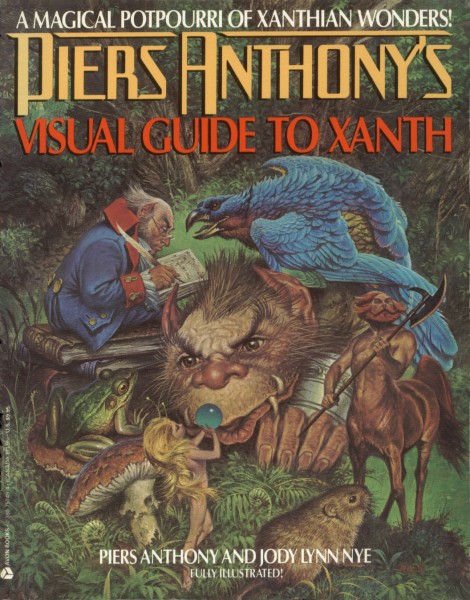
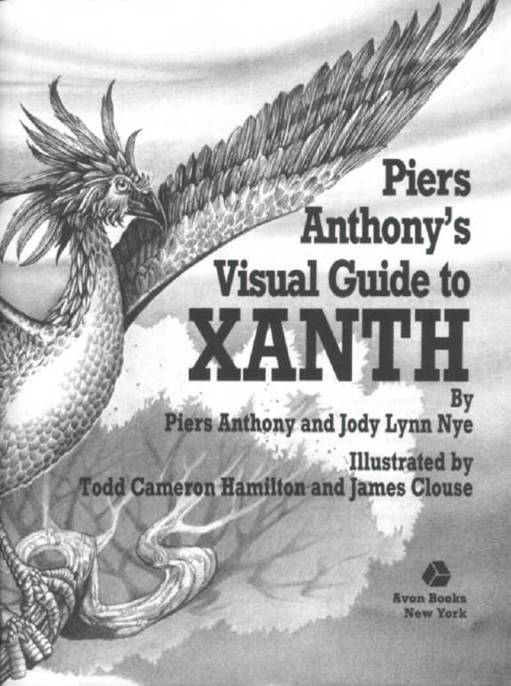
PIERS ANTHONY'S VISUAL GUIDE TO XANTH is an original publication of Avon Books. This work
has never before appeared in book form.
Copyright © 1989 by Bill Fawcett & Associates, Inc.
Cover illustration by Darrell K. Sweet
Published by arrangement with Bill Fawcett & Associates, Inc.
Library of Congress Catalog Card Number: 89-91277
ISBN: 0-380-75749-4
Interior Book Design by Robert T. Garcia
First Avon Books Trade Printing: November 1989
AVON BOOKS
A division of
The Hearst Corporation
105 Madison Avenue
New York, NY 10016
Printed in the U.S.A.
CONTENTS
Introduction to Xanth 8
Great Events in the History of Xanth 18
Xanth 22
The Demon X(A/N)t h and the Balance of Existence 24
People of Xanth 26
Magic and Customs of the People of Xanth 32
Magicians and Kings 34
Harpies and Goblins 48
Demons 52
Centaurs 54
Other Races of Equine Descent 58
Fairies, Imps, Elves, and Gnomes 62
Ogres 64
Voles 66
Zombies 68
Nymphs and Fauns 70
Other Human and Humanlike Folk 74
Other Individuals 80
Places in Xanth 96
North of the Gap 98
North Village 106
The Gap 108
South of the Gap 112
Good Magician Humfrey's Castle 114
Castle Roogna 118
Centaur Isle 138
The Gourd 142
Hazards of Xanth 154
The Bestiary of Xanth 164
The Best Things in Xanth Are Free 178
Flowers 182
Plants 184
Trees 195
Magical Things of Xanth 202
Calendar of Xanth 214
Afterword 218
Appendix: Crewel Lye: Chapter 1 221

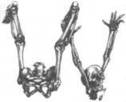 e play a game, my
readers and I: we pretend that the Land of Xanth is real. But as
sometimes happens, especially when magic is involved, reality
changes. Xanth is real, when we take the trouble to understand
it.
e play a game, my
readers and I: we pretend that the Land of Xanth is real. But as
sometimes happens, especially when magic is involved, reality
changes. Xanth is real, when we take the trouble to understand
it.
Do you know the way a computer shows you what you are typing or drawing on the screen? (In Xanth, we have Com-Pewter, which is mostly pewter and crockery, operating similarly, but for the moment let's stick to the dull Mundane version.) Well, if you want to get technical, that's illusion. You aren't really seeing what's in the computer, which is just a bunch of wires and printed circuit boards and what they call chips made out of silicon. You aren't even seeing the squintillion little switches that are all set to ON or OFF inside those chips and things. You are seeing only what the computer wants you to see, which is a picture of a little tiny part of the pattern of all those switches. But you like the way the picture looks, and you think it makes sense, so you are satisfied. You know it is fooling you, but you like to be fooled, because what's on that screen is a lot prettier than the guts of the machine. (The same is true with respect to your girlfriend: her face is prettier than her innards.) So you stick with the representation, the picture, and leave the rest alone. You prefer to settle for the illusion instead of the reality. Well, Xanth is the picture. The reality is Mundania. In Xanth things are magic, while in Mundania they are dully scientific. If we scraped away the magic, we
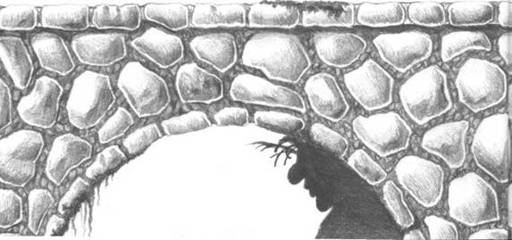
would see the ugly guts of it. We would see the state of Florida, with its crowded highways, polluted rivers, and garbage dumps. But what is the point? We prefer to settle for the magic picture, which explains things in a more interesting and sensible way. The same underlying elements are in each, but one is nicer to look at than the other.
How did this Xanth picture come to be? That is dull history, but if you can
stand it for a few paragraphs we'll soon get on to the good stuff. Back in the mid 1970's I was doing two things. (Well, maybe more, if you count eating, sleeping, raising children, earning a living and such. But that is really too dull to mention.) I was setting up to move to the wilderness of central Florida, and I was making contact with a publisher. The Florida backwoods is different from Miami Beach. It is filled with oak trees and pine trees and sinkholes, instead of big hotels and white beaches. But I'm a backward kind of person, and I thought I'd feel more at home there. So we bought five acres on an old overgrown sand dune and put a cabin on it, and later we put a house on it and moved there. We had a wood stove or warmth in the winter, and fans for coolth in the summer, and we got along. We were in the middle of nature; indeed, the bugs liked to come in to join us, including a little horror of the assassin bug tribe called the bloodsucking conenose, or Mexican bedbug, whose bite raised a painful welt a week long. Remember, this was Mundania; this is the way it is there.
Meanwhile, the publisher was what in due course came to be known as Del Rey
Books. I wanted to write for them (in Mundania, a singular publisher may be plural; don't ask why), but a complicated Mundanian protocol known as an Option prevented me from giving them a science fiction novel. So I tried fantasy instead, though it was generally known that fantasy was a drug on the market, and suitable mainly for lonely distaff writers, not for aggressive characters like me. I didn't expect to get rich or to have a great time, I was just operating on the principle that a writer can never have enough markets for his work. The normal condition for writers, you see, is borderline starvation; the smart ones have some
other source of income, such as a rich inheritance. Also, I wanted to work with an editor who really knew what he was doing, Lester del Rey. Thus I came to sign a contract for A Spell for Chameleon.
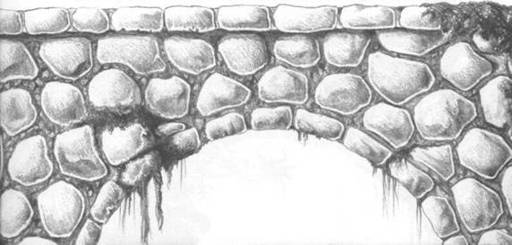
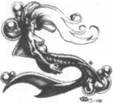 urprise, surprise!
The first surprise was that I did have a good time: I liked this
type of writing. It proceeded swiftly and easily, opening out
before me like the magic landscape it was. Spell was supposed to be a singleton novel, but it
acquired a sequel, and then a third to make it a trilogy. That
trilogy later expanded, until it was nine novels long. Now I'm
starting a second trilogy, which may also be nine novels long. I
mean, everyone knows that's the way things are done in Xanth. (Some
folks poked fun at me for having a fourth novel in a trilogy,
assuming that I really couldn't count. Then other writers, such as
Asimov and Clarke, started doing it, and the laughter died away.
But the trilogies of those others are relatively puny, running only
about half a dozen or so titles.) Once I entered Xanth, I was
unable to leave it. Thus I may have been the first to make that
discovery, though now hundreds of thousands of readers have made
it, too.
urprise, surprise!
The first surprise was that I did have a good time: I liked this
type of writing. It proceeded swiftly and easily, opening out
before me like the magic landscape it was. Spell was supposed to be a singleton novel, but it
acquired a sequel, and then a third to make it a trilogy. That
trilogy later expanded, until it was nine novels long. Now I'm
starting a second trilogy, which may also be nine novels long. I
mean, everyone knows that's the way things are done in Xanth. (Some
folks poked fun at me for having a fourth novel in a trilogy,
assuming that I really couldn't count. Then other writers, such as
Asimov and Clarke, started doing it, and the laughter died away.
But the trilogies of those others are relatively puny, running only
about half a dozen or so titles.) Once I entered Xanth, I was
unable to leave it. Thus I may have been the first to make that
discovery, though now hundreds of thousands of readers have made
it, too.
The second surprise was that I did get rich and famous from it. You see, the normal novel requires something like a year to write, and is on sale for something like ten days before being buried by a particularly ugly Mundane thing called Returns. Ask any writer! A Xanth novel requires something like three months to write, and it stays on sale forever. This is because of the associated magic; any reader who starts reading a Xanth novel breathes the magic dust between its pages and is instantly addicted. (Yes, I know, there is a grotesque exception: the reviewer. For him the magic reverses. Let's try to ignore this painful aspect.) Not only that, the reader feels compelled to proselytize: he collars his friends and makes them poke their noses in too, so they share his fate. Since a bit of money trickles down to me from each copy sold—about one-eleventh of the cover price, if you want to get technical—I keep getting more money. That's nice. It's like standing under a money tree and collecting the cash that keeps drifting down. (If, however, you buy a copy with the cover torn off, no money descends; that is an illegal sale, and the one who makes it keeps everything after paying nothing for the book. He is chopping down the money tree. If you spy one of those dealers, squeal on him to the authorities.) Xanth #1 won an award from the British Fantasy Society as the best fantasy novel of 1977, which is about my only claim to
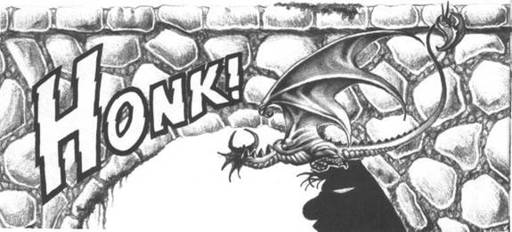
literary acceptance; the rest of the critical. I Never planned to write
world pans Xanth As I like to put it: as Xanth, I began writing
literature Xanth is a joke, but as a fantasy at about the time
commercial enterprise it is about Judy-Lynndel Rey began
as solid as anything gets pushing fantasy. I was
lucky to be able to ride
the wave.
-Piers Anthony
So I was pleasantly surprised on one or two counts (I tend to lose count; is that a trilogy?), and kept on with Xanth. But what I really set out to do, if I can remember back to the beginning of this discussion, was to clarify the origins of Xanth. These are mixed right in with the rest of this. Because I really hadn't expected to get into fantasy, I needed to start from scratch. That meant a setting, some characters, and a plot. What could I write about that hadn't been written about before?
Well, there is a fairly standard all-purpose medieval setting for fantasy, wherein men use swords, wizards do magic, and women are beautiful and useless. Bad wizard absconds with lovely maiden, hero rescues her after suffering much difficulty; as a reward, she kisses him. Anyone who wants to be successful in fantasy will do something like this; the old formula is a good one. So I started with the medieval setting, and the wizards, and a pretty girl. But there is something wrong with my mind; I get turned off by overly familiar stuff. I
wanted at least one halfway original element. What could that be?
I mushed it about in my cranium, and in due course squeezed out a revelation.
Suppose the magic wasn't limited to wizards, sorcerers, magicians or whatever? Suppose each person had a little? Maybe one magic talent per person. And suppose one person didn't have such a talent, so was an outcast?
That was the breakthrough, and it became the device that started Xanth's fame. It seems that the average reader can identify with being an outcast, just as I can, and also hopes for some redeeming talent. What might Joe's talent be, if he were in Xanth? What about Jane's talent? Everybody might have magic, even if it didn't amount to much. The popular fancy caught on to that, and never let go.
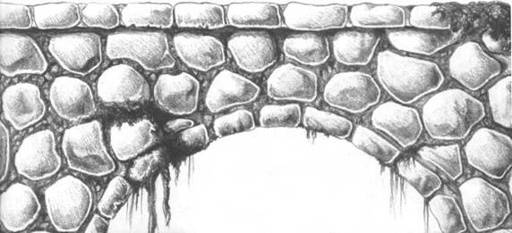
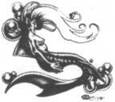 o here was an
average young man, growing up without a talent, just as the average
person in Mundania does. He was contemptuously called "Bink"
because no one took him seriously. He was just coming up on 21, and
if he didn't find some magic soon, he would be exiled. It was like
flunking your final exam: without that passing grade, you don't
graduate, and then you can't get a decent job and you are in effect
exiled from our society and everybody thinks you're stupid, and
you're not sure but what if they aren't right. Maybe you're really
a genius, in some unknown manner —but how do you find out what that
is?
o here was an
average young man, growing up without a talent, just as the average
person in Mundania does. He was contemptuously called "Bink"
because no one took him seriously. He was just coming up on 21, and
if he didn't find some magic soon, he would be exiled. It was like
flunking your final exam: without that passing grade, you don't
graduate, and then you can't get a decent job and you are in effect
exiled from our society and everybody thinks you're stupid, and
you're not sure but what if they aren't right. Maybe you're really
a genius, in some unknown manner —but how do you find out what that
is?
Well, the editor liked the notion, but worried that it would seem too juvenile, so
we had to raise Bink's age to 25. As it turned out, it didn't matter; 12-year-old readers liked him anyway. In fact, Xanth turned out to have a sizable juvenile market, and that, added to its adult market, made the series a bestseller. (As I write this, Xanth #11, Heaven Cent, is the #3 bestseller on the New York Times list; that's not bad. Of course there's always room for improvement; how come it wasn't #1? Grump. I get tired of being third-rate.) Young folk evidently understand about magic talent, and the problems of passing and failing.
The setting turned out to be a sort of peninsula. I didn't realize at first what I was doing, and when I caught on, I didn't tell the publisher, because I might have ruined the impression. Folks can be disillusioned when they discover how things are really done. There was one reader who loved Xanth, until he learned that I really work hard to make novels work, and I struggle all day, every day, taking no vacations, to get them right. That disgusted him; apparently he felt that fantasy should spring effortlessly, fully formed, from the author's lofty brow, a work of pure genius unsullied by the mundane details of plotting and characterization and spelling, or of making actual time to write when others had better uses for my time, such as shovelling manure, taking out garbage, and answering fan mail. The next novel he read was #5, Ogre, Ogre, and he wrote to a fanzine (amateur magazine) and roundly condemned it because, he explained, of the way the author just "pumped them out." Fortunately, no one else caught on to how hard I work at writing, so the series has continued to prosper. (If you want to know THE
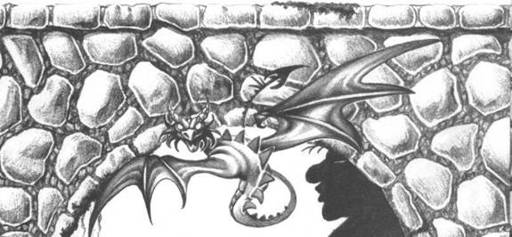
dirty little secret to successful writing, it's WORK. Don't let any other writers
know I told.) But you can imagine how the publisher would have reacted if they
had known that I had a real model for my fantasy land, and that it hadn't
originated entirely inside my bemused Mundane skull.
That model was the Mundane Writing for me is serious. Even
state of Florida. I made Xanth into though much of what I write
exactly the same shape, humourous. Writing, communicating
lake in the south and a big is very important to me. Even before I
swamp in the north and sold my first story, I was keeping
a panhandle projection to diaries and writing just for myself. If I
the west. I put the North Village go to long without writing, I am
at the place where I hoped to uncomfortable. I do it almost
build and move, Inverness, compulsively; fortunately I’m
and Castle Roogna (named after a successful enough that it pays well
- Piers Anthony
correspondent of the time in Estonia, Martin Roogna) in the general vicinity of Tampa. The entire natural landscape of the state translated into that of Xanth, with a bit of magic added. The huge drooping live oak trees with their hanging tentacles of Spanish moss became tangle trees. The bits of lighter knot wood lying on the forest floor became reverse wood, because at first I didn't know where they came from, I just knew that they burned like magic, actually melting down our fireplace grate. The occasional odd tree trunks, with red or purple moss or mold, translated almost unchanged to Xanth, while some with intriguing names, such as silver oak, became literal. After three novels I told the publisher, and by that time the series was well established, so it was too late to stop it, and the true outline of Xanth and its place names like Lake Wails, and Lake Ogre-Chobee, and the Ogre-Fen-Ogre Fen, and the Gold Coast became common knowledge.
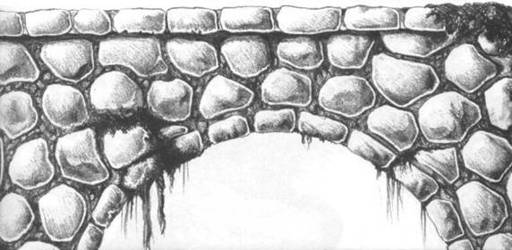
 h, but what about
the Gap Chasm? That doesn't show on any
h, but what about
the Gap Chasm? That doesn't show on any
Mundane map of Florida! Gotcha there, huh, you chortle with the evil glee of a critic.
No you don't. The Gap Chasm is there the same way as everything else is; you just have to see it. Millions of years ago a huge long fault extended across Florida from east to west, angled somewhat. But it got buried under more recent debris: layers of sand, dirt and water, and was forgotten. Only recently did geologists discover it. In fact, they found it only after the first Xanth novel was published; I think that gave them the hint. It was too late to change the maps. But there's an even simpler explanation: the Forget Spell on the Gap Chasm made mapmakers forget to show it. Anyone who falls in it remembers, but since none of those are ever heard from again, the secret remains.
But yes, you are right: there was a more personal origin for the Gap. When we
came up to explore our new five acres back in 1975 (we were buying 2½ and taking a reserve on the adjacent 2½, hoping to save the money to buy them in due course), I walked with my daughters through the forest to the east to see the railroad tracks. You see, once, in prehistoric times, there were great beasts known as Trains, very powerful and steamy, and I wanted the girls to see their ancient tracks so that they would stand in proper awe of what existed before
those newfangled airplanes evolved and ate up all the passengers. We reached the place where the tracks cut through the sand dune that was now our mountain—I mean, the peak is all of 140 feet above sea level, which is pretty high for Florida—and it was an amazing gap. The steep banks descended maybe 20 feet to the bed below, and up even higher on the far side, where the excavated dirt had been thrown. That impressed all of us. Remember, we had
spent our family life in Florida; there are phenomenal ranges of mountains that don't exist here. We gaped at the railroad cut. There were even trees growing down in it, and blackberries; it seemed to be another whole realm. So, slightly (the literary term for it is Hyperbole, which would you believe, is pronounced hy-PER-bo-lee, not Hyper-bole), that cut became the Gap of Xanth. Once they even ran a train up those old tracks, and stored some old
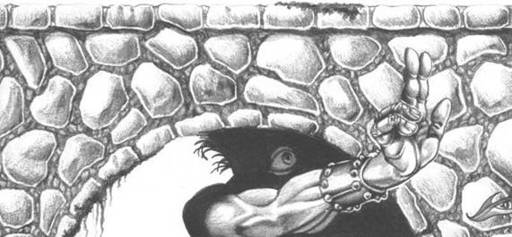
railroad cars there. Naturally the beast of the Xanth Gap had six pairs of whee—,
uh, legs, and it steamed as it moved. Later yet, as the magic of Xanth granted my
wish and brought me money, we managed to buy a section of that cut. It is still
there, but no one remembers it. (Those who prefer more Mundane fiction about
that region can read my non-Xanth novel, Shade of the Tree, set exactly there.
Just don't tell the editor of this book that I mentioned that one; this is supposed
to be limited to Xanth.)
So I had the underlying law of magic—one The Gap was inspired
talent per person, similar to the one vote per by the railroad cut
person supposedly practiced in Mundania. I that runs through our
had the landscape, transcribed at every point property. Normally I find
from Florida. All I had to do was put together inspiration inside
stories involving the two. But there was one myself, not from the
more element that entered the series by surprise: environment, but Florida
the puns. Did initially inspire
Xanth itself.
- Piers Anthony
Xanth started out as light fantasy, but not that light. People did get hurt and killed and
humiliated. But somehow humor crept in increasingly in the second and third novels, and it took over completely thereafter. The pun is said to be the lowest form of humor (which makes one wonder if the bun is the lowest form of bread). Quite a number of folks claim to hate it. But a similar number love it. I don't regard myself as a punster; Xanth just seems to lend itself to puns. Soon readers were sending in puns for me to use in Xanth. I checked them
over and used the best ones, giving credit in little Author's Notes to the originators. But this became a problem, because then folks were sending in whole pages of them, just to get their names into print. I try to answer my mail, but I was getting overwhelmed by a hundred letters a month, mostly relating to Xanth. In addition, the editor was getting fed up; he finally lopped off the entire first chapter of Crewel Lye to get rid of the puns in it. Something had to be done.
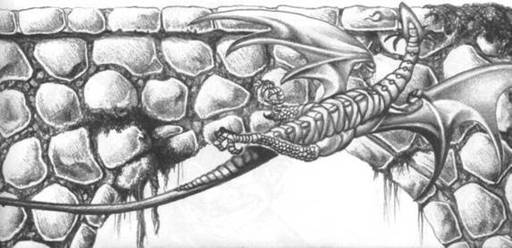
 did several things. I went to a
computer, so that I could answer a number of letters at one
sitting, using computer cards. Once I had a string of 47 cards in
one batch. But even with that speedup, there were too many; it got
to the point where one month I answered 221 letters
did several things. I went to a
computer, so that I could answer a number of letters at one
sitting, using computer cards. Once I had a string of 47 cards in
one batch. But even with that speedup, there were too many; it got
to the point where one month I answered 221 letters
and lost half my working time to the mails. That was no good; my output would suffer if I couldn't save more time to write novels. So finally I set up with a secretary. That made my answers less personal, but it recovered some of my time. Some readers don't like that; they don't want a secretary, they don't want a computer, they insist on personal holographic (that
is, written in longhand: pen and ink) letters from me. You know how much of my working time it would have taken to do that, in that worst month? All of it. Maybe that would have made those readers happy, but it wouldn't have done much for those who wanted to read my next novels, and it could have become difficult for me to earn my living. Somehow these readers seem to feel that my livelihood doesn't matter; that I owe them all personal answers. One even condemned me for saying that I didn't want even more letters. I replied that when he spent a quarter or half of his earning-a-living time for nonpaying correspondence, then
he could criticize me. I didn't hear from him again.
Another thing I did was to tackle the source of the problem. I advised readers in the Author's Notes that I didn't want any more puns, and I stopped using them. Vale of the Vole had no reader-suggested puns and no Author's Notes. Thereafter I used a few, but did not encourage them. Xanth itself is no longer as punnish as it once was; now you know why. Oh, the mail continues, but there aren't so many pages of puns in it. Some letters, incidentally, now are from folks who were born after the first Xanth novel was published in 1977.
So Xanth is real, in ways that I didn't anticipate and don't always appreciate. But the fact remains that Xanth is the engine that powers my bestselling career. We live in a nice house now, on a nice property; my wife calls it the house that Xanth built. My daughters grew up on Xanth and are now in college because Xanth made it affordable. Don't tell me it's not real!
Last and least, what about the name? Where did I find the term "Xanth"? The
word "Mundania" is adapted from the words used by fantasy fans—you know,
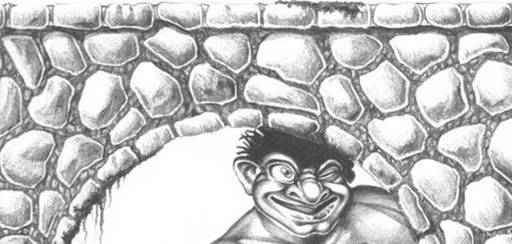
those things made out of bamboo and paper that blow cool air—to describe the rest of us who aren't fans. But Xanth is the magic realm, so naturally it has a phenomenal story behind it, you think. Ha—it's the most Mundanish of them all. Back in the 60's I bought some books of names for babies, which I used for naming the characters in my novels. I liked the name Xanthe, which derives from the Greek word for blond. That is, a fair-haired girl. Maybe I should have named my blond daughter that, but at first I didn't know her hair was yellow, because it was dark; only as it grew out longer did it sunbleach light. So there was this nice
name. I used it in a story, "Xanthe's Heart," about a young man who loved his girlfriend Xanthe and wanted her heart; they were in a car accident together, and when he woke up, he had her heart, transplanted to replace his, which had been destroyed along with her life. That story never found a home and was duly retired. So when I needed a name for my fantasy land, I used it, only this time amputating the terminal "e." That did it; editors will buy something after it has been cut or mutilated in some way, though usually they prefer to do the chopping themselves. Thus Xanth, just a chance adaptation. At that point I didn't know there would be more than one novel, or that A Spell for Chameleon would sell over 700,000 copies and keep going for over a decade and maybe forever. I thought it was just another novel. I know, I know; I was criminally ignorant. But that's the way it was. Maybe if I thought about it more carefully I would have come up with a more sensible name like Oz or Narnia or Middle Earth or Amber or Shannara or The Land. Sorry about that.

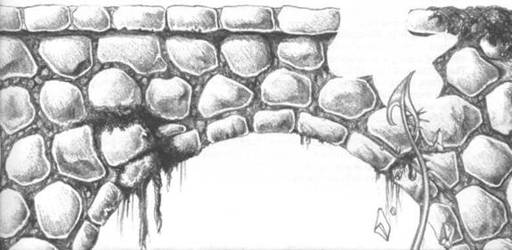
GREAT EVENTS
IN THE HISTORY
OF XANTH
 n its earliest
days, Xanth was a peaceful land in which the centaurs were the
dominant species. Strong magic abounded. Magical creatures were
still fairly primitive. The individual characteristics which made
up the new composites hadn't yet blended into a smooth whole. The
centaurs themselves appeared rough-hewn, unlike the thoroughly
evolved creatures of today.
n its earliest
days, Xanth was a peaceful land in which the centaurs were the
dominant species. Strong magic abounded. Magical creatures were
still fairly primitive. The individual characteristics which made
up the new composites hadn't yet blended into a smooth whole. The
centaurs themselves appeared rough-hewn, unlike the thoroughly
evolved creatures of today.
The first humans wandered into Xanth a few at a time. Most of them died there, but others eked out their livings because they didn't dare to return to Mundania. They had little effect on the land, which continued to exist in peace.
Then, a large number of humans moved into the Peninsula—the First Wave. Believing in safety in numbers, these cut down hundreds of trees, and cleared tracts of land for crops. The Firstwavers discovered that all Xanth was permeated with magic, so they built an enclosure, the first stockade, and burned all greenery and killed or chased away all animals within its confines. They brought in Mundane food and animals, and Mundane women to marry. To their surprise, their children were born with magic. The environmental
effect of Xanth was to imbue each real creature born there with a talent. These humans liked the idea of children with magic, and decided to stay.
At first, there was quite enough magic to repulse them, but the denizens of Xanth were so taken aback by the brutality and ravage of the humans' invasion that they did nothing.
There was a time of foolish overreaction when it was discovered that one of the Firstwavers' children could transform lead into gold. The hills were scoured for lead. The Mundanes learned that Xanth had a surplus of gold, and stormed the stockade, killing everyone but the women, whom they married. This was the Second Wave. It was learned too late that one of the dead children was responsible for Xanth's prosperity.
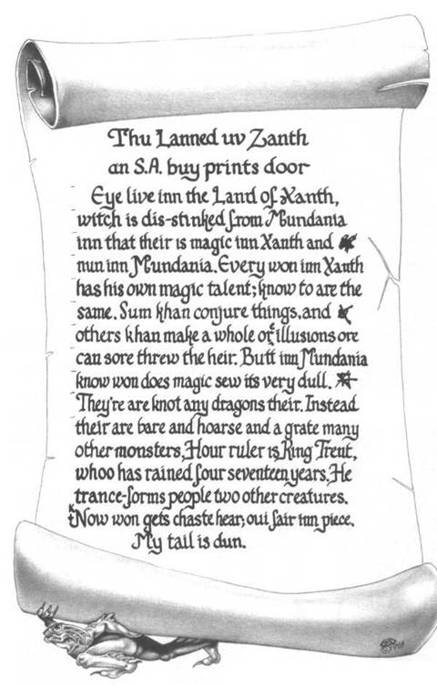
This is the only piece of scholarship
Contributed by King Dor the communicator
to the body of knowledge about Xanth
The Secondwavers were vicious thieves who committed atrocities, such as the killing of centaurs for meat. A truce was reached, but not until the centaurs had killed half the invading men.
Over time, the Secondwavers became peaceful and settled down. Several generations later, the Third Wave invaded, again killing all but the women, who were once again pressed into marriage with their conquerors. Few of the men survived long, for the women had the lesson of history before them. They killed all the men, using magic and any other means at their disposals. Realizing that they were now left with no families in the wilderness of Xanth, the women, some old, some battle-scarred, all weary, organized to bring in new husbands. These men were of a completely different breed from the raiders. They were strong, intelligent, fearless men who knew about the history and the magic of Xanth, but remained in spite of them. Young women immigrated too, to marry some of the children, so the bloodlines would not be too closely inbred. The Fourth Wave was the beginning of human dominance of Xanth. It marked the date of a deliberate, thoughtful settlement of the land.
Magician-caliber talent began to appear after the Fourth Wave. The Fifth Wave began again the tradition of conquest and pillage. With the help of an unknown soldier (to whom a small unmarked statue exists in Castle Roogna) and a giant spider, the major assault failed when the nonhuman population of Xanth joined against the invaders. A Forget Spell was detonated in the Gap, thereby rendering it forgettable to anyone who did not live immediately within its environs.
The next seven waves lasted from a few years to several generations before those humans settled down to a life of peace in Xanth.
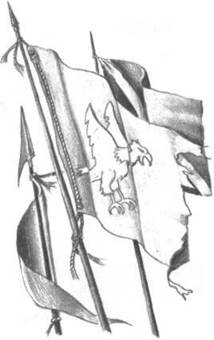
The Twelfth Wave was the last for 125 years before the ascent of King Trent. Fifteen years after it had ended, a Deathstone of great potency was altered by King Ebnez to form a shield around the whole of Xanth. The shield, which was visible as a sparkling haze in the sunlight, lasted 110 years before it was removed.
The Thirteenth Wave was a deliberate action on the part of the exiled Evil Magician Trent. His army was drilled to use only the force needed to secure the throne for him, and no
more. He saw Xanth's isolation as stagnation, and vowed to open the border to the outer world for controlled colonization, as in the Fourth Wave.
There are records of creatures of human descent millennia before the First Wave of
colonization, so humans must have been wandering into Xanth long before any numbers of them lived there. As Xanth remains isolated, humans as well as creatures change, becoming gradually more mutated by magic. New blood, Mundane blood, is necessary to Xanth's survival. Even Humfrey is becoming a true gnome as time goes by.
The Fourteenth Wave was an invasion by General Hasbinbad and his Carthaginian mercenaries who crossed the isthmus from the Po Valley in Mundania of 210 to 215 B.C.E., collaborating with a citizen of Xanth known as the Horseman. Trent was incapacitated, so he was succeeded by King Dor. The Mundanes flowed down the western edge of Xanth, taking the invisible bridge they were shown by the Horseman. The creatures of Xanth cooperated to fight them, as they had in the Fifth Wave.
When Dor fell to the power of the Horseman, he was followed by the Zombie Master Jonathan, Good Magician Humfrey, Bink, Centaur Magician Arnolde, Queen Iris, Irene, Chameleon, and the Night Mare Imbrium. In all, there were ten kings pro tem to avoid leaving the throne open for the Horseman to crown himself King. Xanth was saved by Mare Imbrium, who sacrificed herself in the Void to destroy the Horseman's short circuit.
The Time of No Magic: Royal researcher Bink freed the Demon X(A/N)th from its thousand-year penalty in the Game it had been playing. As all magic had issued from X(A/N)th all magic went with it when the Demon left. Living magical creatures gradually began to turn Mundane, and all things created by spells died or vanished. Charmed implements lost their charm, and had to be used as any similar Mundane tool would. Fairies and dragons could no longer fly, though they retained their wings.
It was also because of this Time that the Brain Coral's preservative pool was opened, and Magician Murphy and Neo-Sorceress Vadne escaped from there to Mundania, where Magician Grey (for whom the stork had been summoned on the edge of the Gap Chasm) was born.
There were other benefits to the Time. The effect of the Gorgon's gaze was reversed, so the men who had been transformed into stone were restored to flesh. The victims of Midas bugs and stone-crop also came back to life.
Shortly after Bink set him free, X(A/N)th returned to his cavern voluntarily, to ponder rule changes for an eon or two. (It was believed by King Trent that Bink's awesome talent for protection from magic brought X(A/N)th back, but his theory is not generally known.)
Though it was distressing to all the citizens of Xanth to be without their magic, they appreciate their talents as never before.
Xanth/Mundane Cooperative Ventures: Other than the waves and the odd exile, Xanth had had no official intercourse with Mundania. King Trent and Queen Iris sought to establish trade with a "beleagured Kingdom," a "body of black water" and "surrounded by hostile A's, B's and K's" (Avars, Bulgars and Khazars). While they were making peaceful overtures in the friendly kingdom of Onesti on the Black Sea they were imprisoned by a treacherous usurper. In their efforts to rescue them, King pro tem Dor, Irene, and Arnolde the Magician, a Centaur scholar, established a working relationship with a trustworthy Mundane archivist named Ichabod, who was later allowed access to the libraries of Xanth, and acted as a researcher on Xanth's behalf and friend to Arnolde. Trade agreements with Onesti were thereafter negotiated with the rightful King, Good Omen.
XANTH
 he land of Xanth is
a peninsula, which moves around the face of the Earth (some say) to
prevent its unique character from being diluted or subsumed by the
other cultures that exist in more Mundane lands. Xanth is unusual
in many ways, the most important being that it is rich in magic.
Species exist there that have never been glimpsed or dreamed of
outside its borders. And any child born there is endowed with his
or her own
he land of Xanth is
a peninsula, which moves around the face of the Earth (some say) to
prevent its unique character from being diluted or subsumed by the
other cultures that exist in more Mundane lands. Xanth is unusual
in many ways, the most important being that it is rich in magic.
Species exist there that have never been glimpsed or dreamed of
outside its borders. And any child born there is endowed with his
or her own
magical talent. Over the thousands of years that Xanth has been a magic land, its residents have changed drastically several times. To the untrained eye, Last Wave Xanth resembled the Korean peninsula of the thirteenth century, common era. During the Mundane Era of the Punic Wars, Xanth bore a striking likeness to Italy; to the Avars near the Black Sea, it resembled the Baltic peninsula, and modern Xanth would seem to wear the face of the state
of Florida in the United States of America. The human population is somewhere between two and five thousand. No official survey has ever been made of the population of the other species.
Possibly in the ancient past, Xanth was an island, and retained its unique character through complete isolation until the land bridge was formed. Access remains complicated, since Xanth is not fixed in time the way Mundane lands are. If correct timing is not observed, there is no guarantee that the era you left when you entered Xanth is the same to which you would return. Each era "window" lasts between five minutes and an hour, though the window can be left open if it is occupied by a traveler from Xanth, so that he will reenter Xanth in the same time frame he left it. The knowledgeable traveler will watch the color of the water to determine on which era the window is open. To the Mundane (non-Xanth) world at large, Xanth remains a myth, known only in stories and legends. Except during the Waves of Colonization which bring new human settlers, or in the upheaval of a wiggle swarm, it is a peaceful land— for one that uses puns as fundamental building blocks.
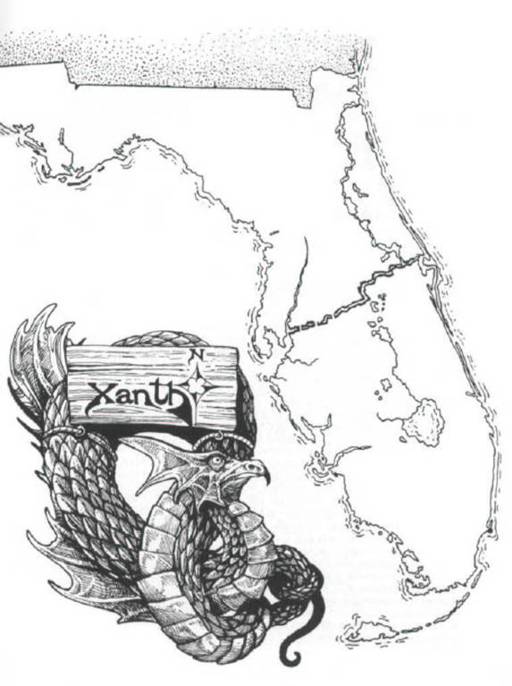
THE DEMON
X(A/N)th AND
THE BALANCE
OF EXISTENCE
 anth was once a
magicless land just like Mundania. Its magic issues from the aura
of the Demon X(A/N)th, who became trapped
deep underground over a thousand years ago.
X(A/N)th was compelled to serve a penalty for failing to complete
a formula in the required time during the course of a
multiverse-wide Game it is playing with other infinite
anth was once a
magicless land just like Mundania. Its magic issues from the aura
of the Demon X(A/N)th, who became trapped
deep underground over a thousand years ago.
X(A/N)th was compelled to serve a penalty for failing to complete
a formula in the required time during the course of a
multiverse-wide Game it is playing with other infinite
entities. The Demon has no real name. X(A/N)th is the expressed formula that is the means by which it plays the Game and how the still running score is determined. The entities negotiate for increases or decreases in value of their terms and exponents, which are not really numbers, but concepts such as gravity, density, luminosity, charm, and other cosmic characteristics. X(A/N)th remains in the depths of Xanth because he is currently contemplating a change of rules in the Game.
Demons are all-powerful and all-intelligent, though not omniscient. The magic that the Demon X(A/N)th emits is only a tiny trickle of his full magical power. His influence issues up through the ground in a sort of solid fountain that reaches the surface as magic dust, which is distributed by the citizens of the Magic Dust Village, situated in the middle of the Region of Madness.
X(A/N)th's magic caused changes to begin immediately in the surface world, first subtly, and then more obviously. Species of plants and animals unlike anything ever before seen began to spring up. (Some of those early ones, like dragons and manticores, escaped to the outside world, where they were described by people who were either turned off as loony or became famous storytellers as a result of their sightings of these fantastic beasts.) Love
springs, the residue of X(A/N)th's magic in upwelling groundwater, caused otherwise incompatible species to mate and breed new hybrids. Very soon, combinations of men and beast, beast and beast, beast and plant (samphires), or man and plant (hamadryads) appeared. Centaur history cites the love springs as being responsible for the creation of their species.
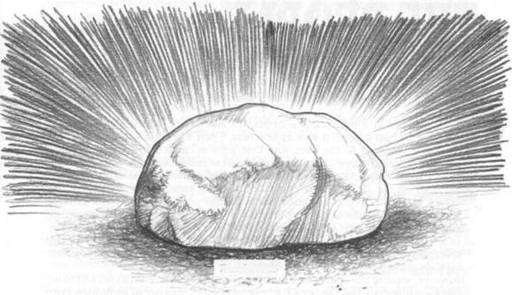
Deathstone
Pure human beings, too, were caught in the wave of magic. Adults or children who wandered into Xanth did not acquire magic themselves, but their offspring, the second generation, showed signs of possessing spells and talents of their own. Soon another wave of humanity then found its way into Xanth, much as the first had, and added fresh blood to the population.
Periodically, over Xanth's history, the Nextwavers, or invading bands of men, have entered Xanth. Their incursions were nearly always bloody, but it was always to Xanth's benefit in the long run. Like C. S. Lewis's land of Narnia, it is not necessarily a human's land, but it is good for a human to rule. There have been fourteen waves to date.
To protect Xanth from intruders, a Magician King took a huge Deathstone and tuned it to cast a deadly shield all around the peninsula, guarding its sea borders on three sides and its land border on the fourth. The shield could be opened only briefly for some purposes by certain talented humans. Since it could no longer be diluted by Mundane blood and stimuli, the population of Xanth was in danger of becoming extinct through continual inbreeding.
Magical types were not as numerous or as well developed in the early human history of Xanth than later on, and the mutations became stranger. Magic was becoming too concentrated. As before, the children of Mundane settlers had magic. Over many following generations, the adapted humans BECAME magic, evolving into giants, dwarves, gnomes, elves, or mating with other species to become new magical creatures. Over many generations, these new hybrids grew inbred and peculiar.
In the reign of King Trent, that Shieldstone was moved to the cavern of the Demon X(A/N)th, and the border was left open to those who could find it.
THE PEOPLE
OF XANTH
 ear in mind that
the origins of Xanth are hopelessly Mundane. When I needed new
characters, I just looked around and found whoever fit the part,
and that person came into existence. After that, the new character
would sort of run his own show. The writing
ear in mind that
the origins of Xanth are hopelessly Mundane. When I needed new
characters, I just looked around and found whoever fit the part,
and that person came into existence. After that, the new character
would sort of run his own show. The writing
of Xanth has been as much a process of discovery as of invention; it is as if I set up the rules of the game, then explored the ramifications. (Ramifications are like male sheep who run around butting down fortifications; you never can tell what will turn up in the resulting
rubble. They are distantly related to the battering rams and the hydraulic rams, all of which tend to be rambunctious.) There is a listing further along of all the characters we could catch; some may have escaped, but just about anybody who is anybody agreed to pose for that occasion.
However, some of the characters developed a hidden side. I didn't set out to do it that way, it just sort of happened, in somewhat the manner of forbidden love. Thus they came to have Mundane analogues. Now in the genre when someone takes real people and writes them into fiction, it is called Tuckerization, after a writer named Wilson Tucker who did that. I never got along well with Tucker, but I give grudging credit where it is due. I didn't do that; all my characters started in Xanth, not Mundania. They just didn't quite stay there.
Well, now that I doublecheck, I see that there were a couple. There was EmJay and Ass MiKe, who compiled the Lexicon of Xanth, published in X9, Golem in the
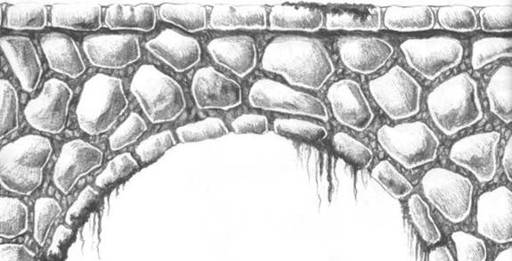
Gears. I made them characters, so they could Sometimes my characters
get in there and do their job. (It is very difficult do develop in ways I
for a Mundane to get into Xanth via normal don’t expect, Nada Naga
channels.) That was so successful that EmJay was meant to be a bit part
married half of the Ass, which I suppose makes and she was going to be a
her husband half—um, maybe I can rephrase girl of eight. Instead she
that if I think about it. They're nice people who became a real character,
don't deserve such irreverence. Shows you the and a girl of fourteen,
fate of nice people, in Mundania. which complicated
everything. I found I had a
There was also Joey, who made the Isles of real character with real
Joey in X11, Heaven Cent. He didn't appear as a problems. Now she is a
character, but he was named in the story. He major character and will be
was 11 when X11 was published, fittingly. (All around Xanth a long time.
things make sense; you just have to fathom Grundy also started as how they make sense.) minor plot item and just
grew into a very interesting
My daughters could not be excluded, of character.
course, or their horses. Tandy looks just like -Piers Anthony
Cheryl as she was when I wrote Ogre, Ogre, and
Ivy is like Penny, all the way from three to seventeen. Cheryl's white horse Misty suffered
a sex change and modeled for the day horse, and Penny's black horse Sky Blue became Mare
Imbri. Blue still likes to play night mare when it gets dark, because she becomes invisible. (Blue was also the model for Neysa the Unicorn in the Adept series. She gets around. The name Neysa came readily, because Blue is a neighing horse; she neighs to say hello, or to call attention to something, or she asks for fee-eee-eee-eed. She's thirty at this writing, and still spry.)
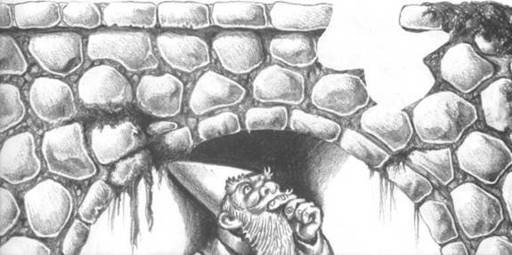
 ut mainly it was
the other way around. First, of course, is the Ogre: that's me, as
in Bio of an Ogre. I also identify to some
degree with many other characters, such as Bink, who was a
nonentity without a talent until he discovered an excellent hidden
talent; mine turned out to be writing light fantasy, but if you
passed me on the street you would see right away that in Mundania I
remain painfully nonentitious. My talent doesn't show physically,
you see. But I'm also the Zombie Master in that I'm thin; one
article on me likened my body type to that of a praying mantis. I
am also fascinated by death. But mainly I'm the vegetarian ogre who
smashes down all opposition in the genre publications. Ask anyone
who has ever tangled with me there, but don't tell him you're my
friend or he'll punch out your lights before answering your
question. My special targets for smashing are reviewers and
critics; I suspect that the only good critic is a squished one.
Well, isn't that obvious? But I didn't set out to pattern these
characters on myself; I merely recognized aspects of myself after
the characters
ut mainly it was
the other way around. First, of course, is the Ogre: that's me, as
in Bio of an Ogre. I also identify to some
degree with many other characters, such as Bink, who was a
nonentity without a talent until he discovered an excellent hidden
talent; mine turned out to be writing light fantasy, but if you
passed me on the street you would see right away that in Mundania I
remain painfully nonentitious. My talent doesn't show physically,
you see. But I'm also the Zombie Master in that I'm thin; one
article on me likened my body type to that of a praying mantis. I
am also fascinated by death. But mainly I'm the vegetarian ogre who
smashes down all opposition in the genre publications. Ask anyone
who has ever tangled with me there, but don't tell him you're my
friend or he'll punch out your lights before answering your
question. My special targets for smashing are reviewers and
critics; I suspect that the only good critic is a squished one.
Well, isn't that obvious? But I didn't set out to pattern these
characters on myself; I merely recognized aspects of myself after
the characters
came into being.
Sometimes I recognize aspects of other folks as I watch my characters. In X12, Man from Mundania, the Sorceress Tapis is a grand old lady with singular artistic and magical talent and excellent temperament. When I think of her I think of Andre Norton, who has similar qualities. I think the aspect of the 1987 World Fantasy Convention in Nashville, Mundania, that I remember most fondly are the three breakfasts I shared with her there, chatting about the things authors chat about: problems with agents, publishers and fans. If none of those folks existed, the life of writers would be a lot simpler. I have a kind of contest
with her to see which of us can attend the fewest conventions; it's close, but I think I'm gaining.
Some places, too, may have Mundane parallels. There's Lake Ogre-Chobee, and the Ogre-Fen-Ogre Fen, and Lake Wails, and the No Name Key, and the With-ACookee River, and the Ever-Glades and who knows what else. The Isle of Illusion just happens to be where so many Mundane efforts to send ships into space occurred; naturally there were some spectacular failures, because Mundanes
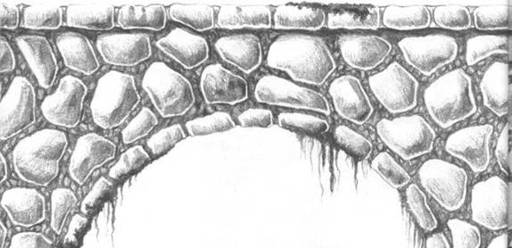
are, well, Mundanes. There's the Kiss-Mee River, where Mundane demons masquerading as the U. S. Army Corps of Engineers channelized that Kissimmee River just the way the demons did in Xanth, with similarly awful results. How much better things might be if demons would just leave the environment alone! But perhaps the major identifications are the Good Magician Humfrey and the Gorgon. I don't know when it started, but I know it happened, because, well, because. Humfrey became my editor, Lester del Rey: small, old, grouchy, and more knowledgeable than anyone else. Humfrey
married the Gorgon, and she became Judy-Lynn Sometimes my fictional
del Rey. Here the description is not physical, it's characters take on a
character. Judy-Lynn started as a nice young mundane identity, The
woman whom it was unwise to cross, and Gorgon started without any
became one of the most formidable figures in the connection and ended up
genre and indeed, in Parnassus itself. When her being very similar to my
eye fell on something, it knew it had better get editor.
moving fast. When his knowledge and her drive -Piers Anthony
combined, Del Rey Books forged to the top of the
genre heap. He picked 'em, she promoted 'em, and nonentities like Stephen Donaldson, Terry
Brooks, David Eddings and Piers Anthony became the bestselling fantasy authors of the day.
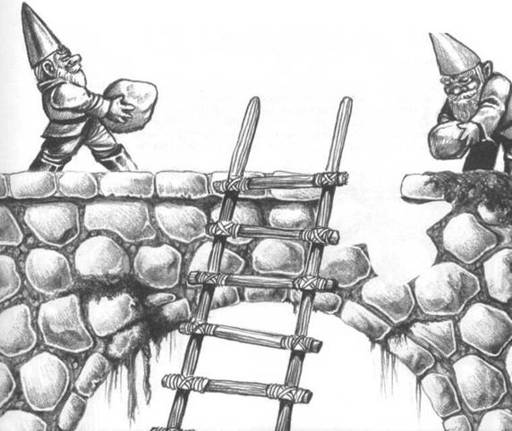
 f you check in the
credits section of X7, Dragon on a
Pedestal, you'll see Judy-Lynn del Rey listed for the Fountain
of Youth and Gorgon-zola cheese. The Fountain was to enable Humfrey
to live longer, and the cheese—well, you can see that Judy-Lynn
knew who she was, even though I never discussed it with her. I did
remark that the fans would think she was just another young fan,
and she responded, "I am a young fan!" Right on. When I said in a
Note that the publisher's gaze was like that of the Gorgon when an
author was late with a manuscript, a fan wrote something to the
effect that it wasn't that bad, and Judy-Lynn wrote on the letter
something to the effect of "Ha!" Oh yes, she knew!
f you check in the
credits section of X7, Dragon on a
Pedestal, you'll see Judy-Lynn del Rey listed for the Fountain
of Youth and Gorgon-zola cheese. The Fountain was to enable Humfrey
to live longer, and the cheese—well, you can see that Judy-Lynn
knew who she was, even though I never discussed it with her. I did
remark that the fans would think she was just another young fan,
and she responded, "I am a young fan!" Right on. When I said in a
Note that the publisher's gaze was like that of the Gorgon when an
author was late with a manuscript, a fan wrote something to the
effect that it wasn't that bad, and Judy-Lynn wrote on the letter
something to the effect of "Ha!" Oh yes, she knew!
Then it soured. I put in things like the Gorgon stoning little bulls so that they turned up in Mundania as statues, but Lester del Rey edited them out. You see, Judy-Lynn had this little collection of Papal Bulls, named after prominent Popes, and one of them even had an agent, the Scott Meredith Agency. In fact, I once received a fan letter sent through that Bull. I guess Lester thought I was playing it too close. He cut that out, and later on got to cutting more. Judy-Lynn—well, there's no nice way to state this. She died. It was a surprise stroke that took her out young. After that, things sort of fell apart between Anthony and Del Rey
Books, and my business went elsewhere. It was a tragedy on several levels, and not at all the fun kind of thing you see in Xanth.
Doing Xanth for a new publisher, I had a problem: what to do with Good Magician Humfrey and the Gorgon? I was no longer working with them, and there was not much way their lives could continue to parallel their Mundane versions. No good character ever truly dies in Xanth, even of old age; they just retreat gracefully into the background and let the young ones have the stage. It is part of the Xanth formula to let the protagonist (main character) go see the Good Magician, and have an awful time getting in. (I'm getting more like Humfrey in that respect; with my mail threatening to rise above a hundred letters a month, maybe way above, and people wanting to visit me, I have to slow them down some way. So my residence now has similarities to the Good Magician's castle, and only a few folks get through.) How could I have that, if Humfrey and the Gorgon faded

gracefully out? But if they didn't, I would have to risk the Gorgon's death. No way.
So they departed ungracefully: they abruptly disappeared. When Esk Ogre and his companions arrived, the castle was deserted. That started a three-novel mystery—actually a four-novel mystery, because not until Xanth #14, Question Quest, do we get to see the whole century-long life of the Good Magician. In the interim, Xanth just has to lurch along without him, until finding a temporary replacement in X12, Man from, Mundania. At least the challenges at the castle continue! This shows the complications that can arise when real people get tangled up with fictional characters. It is harder to write a script for real folk; they are ornery about going their own ways. I hope real folk stay out of Xanth in the future, but some may sneak in the way the others did. There are even a few Mundane places that sneak in. Onesti and Ocna, where there is action in X4, Centaur Aisle, exist exactly where described: some distance in from the Black Sea (you noticed the black water?) in Rumania. Our intrepid party also ventured through the crimson tide, as far as Montgomery, Alabama,
anyway, where they met Ichabod.
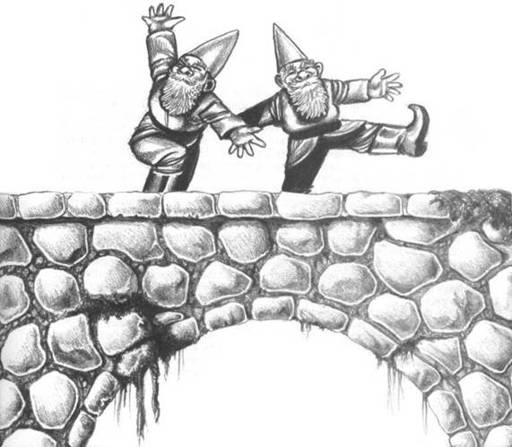
MAGIC
AND CUSTOMS
OF THE PEOPLE
OF XANTH
 ossession of magic
is sometimes dependent upon possession of a soul. Souls manifest as
infinitely delicate spheres when separated from the body, and they
are infinitely precious. Creatures which do not have souls can BE
magic, but as a rule do not possess a magic talent. Creatures which
are magic have been magically engendered, such as griffins and
dragons. Humans, and their many related races (such as harpies and
goblins), have magical talents in proportion to their fraction of
souls. The soul can eventually regenerate if a part of it is torn
away.
ossession of magic
is sometimes dependent upon possession of a soul. Souls manifest as
infinitely delicate spheres when separated from the body, and they
are infinitely precious. Creatures which do not have souls can BE
magic, but as a rule do not possess a magic talent. Creatures which
are magic have been magically engendered, such as griffins and
dragons. Humans, and their many related races (such as harpies and
goblins), have magical talents in proportion to their fraction of
souls. The soul can eventually regenerate if a part of it is torn
away.
In magical creatures, their magic is considered part of their nature, and not as controllable talent. At first it was believed that all people had talents that were different, but it was found that Curse Fiends all have the same talent, so perhaps they have become magical creatures after all these generations in Xanth. The discovery in the Fourteenth Wave of magical creatures who can do magic changed the existing theories of the nature of talent. Some magically spawned races, such as centaurs, have been established for so long that they
have become a natural race, and so have developed their own individual talents.
An old custom among the human population demanded that a young man or woman had to show signs of talent before his or her 25th birthday. That talent didn't have to be interesting, powerful, or even useful. Some could make a colored spot appear on a wall, untangle knots by looking at them, or make roses smell of garlic. To be citizens of Xanth they simply had to have a magical ability of some kind. Nearly all children showed their talent early in life. Those who didn't usually manifested theirs during puberty. To fail to show talent was grounds for expulsion from Xanth. The custom died out around the same time the Shieldstone was removed from the border. People were thereafter accorded respect not for their magic alone, but for their other qualities.
It is considered necessary to exercise one's talent, or it will stagnate. Type of talent depends on need, environment, and personality. The strongest talents in any generation are known as Magician-caliber or Magician-class. In the past, Magicians have come forward who were capable of doing matter transformations or creative meteorology. Magic itself is neither good nor evil; it is the intent with which it is used that designates whether the user will be known as the Evil Magician, or the Good Sorceress. As Queen Irene noted, there is an ethical dimension to power, especially great power. It should be used responsibly, or not at all.
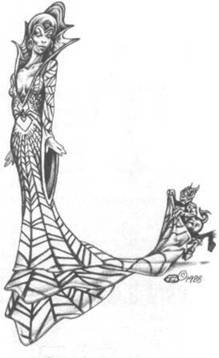
Talents tend to overlap, though with two notable exceptions no two have ever been exactly the same. The strength of talents is not hereditary except in the case of ogres, whose hereditary talents are strength and stupidity, and the Curse Fiends, who all have the same magic; there is no way to predict what type or potency of talent a human child will develop. But there is one exception: because Bink did the Demon X(A/N)th the favor of freeing him, the Demon (prompted by Cherie Centaur) made all of his descendants have Magician-class magic. Thus, Dor had it, and Ivy and Dolph. That was to make a big difference in the history of Xanth, and to usher in what may someday come to be known as the Golden Age, with a number of Magicians and Good Kings.
It used to be that the King was chosen by the leaders of Xanth from the available Magicians. Now, with Magicians being in the direct line of descent, it has become in effect hereditary, and women can be King too. Xanth is hopelessly oriented on male prerogatives, to Queen Irene's ire, but progress is being made. No Queen can rule, but a female King can.
Of course the other species of Xanth have their own leaders, and these regard themselves as rulers of all Xanth, because they don't take much account of human politics. So the Dragon King is the supreme ruler of Xanth, and so is the Lord of the Flies, and the King of the Elves, and the Goblin King, and the King of the Basilisks, the Night Stallion of the Gourd, and so on. It's all a matter of viewpoint. Sometimes liaisons are made between royal houses, as when Prince Dolph is betrothed to Princess Nada Naga. It all works out. Since the Xanth histories that are smuggled into Mundania are for a human audience, the perspective of the human species tends to be followed, but this should not be taken too seriously.
MAGICIANS
AND KINGS
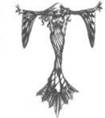 he last King of the
Fourth Wave was Roogna, best known for his talent, which was
adapting living magic to his purposes, and as the architect of
Castle Roogna, the first central seat of human government in Xanth.
Roogna was a gentle, pudgy, solidly built
he last King of the
Fourth Wave was Roogna, best known for his talent, which was
adapting living magic to his purposes, and as the architect of
Castle Roogna, the first central seat of human government in Xanth.
Roogna was a gentle, pudgy, solidly built
man in coveralls who enjoyed gardening. He appeared to be an unlikely defender against the Fifth Wave, though it was under his direction that Xanth was mustered.
Roogna's contemporaries were Magician Murphy, Jonathan the Zombie Master, and Neo-Sorceress Vadne. Murphy's talent was making things go wrong. His is a subtle magic: almost nothing is immune to his influence. What can't be misdirected might just refuse to work. Murphy made a wager with Roogna that the Castle wouldn't be finished in time to stand as a defense against the Fifth Wave. He was not a traitor to Xanth; it was of academic
interest to him whether he could be beaten.
Jonathan the Zombie Master was the third Magician of the era of Roogna. His talent is the power to animate the dead. If any corpse is brought to him, no matter how poor its condition, Jonathan's power causes it to move with a half-life forever, unless the zombie is torn into too many small pieces.
Jonathan was a solitary child and then a solitary man until he met Millie the Maid. They fell in love and would have married if it hadn't been for the interference of Neo-Sorceress Vadne. Jonathan committed suicide and spelled himself into a zombie, which he remained for 812 years until he was disenchanted by a Restorative Elixir he had brewed and entrusted to a barbarian named Dor.
Neo-Sorceress Vadne's talent, topology magic, was not considered to be of Magician-caliber. She was able to change the form of living things without changing their nature. She was bitter that her magic didn't get the recognition she felt she deserved, and she was jealous of Millie, so she used her magic to transform the girl into the shape of a book. For her crime, she was sent
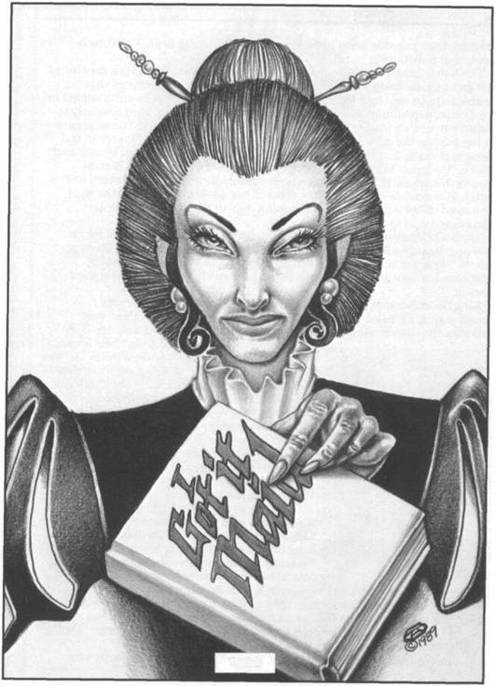
through the vanishing hoop into the storage pool of the Brain Coral, to be preserved indefinitely.
The fourth Magician of the Fourth Wave was the Sorceress Tapis, creator of the great Castle Roogna Tapestry. Her talent was sewing tapestries that enable folks to step into their worlds. Her needlework could be entertaining or predictive, depending on need. Her picture tapestries functioned similarly to magic mirrors, displaying to those with sufficient will to control them scenes in the past or the present. At other times, the magical moving figures in the designs provide simple entertainment, showing pleasant sights of beauty and plenty. The great historical Tapestry was intended to be a gift to Zombie Master Jonathan. Her home was a large thatched cottage in the forest, near a patch of chocolate milkweed. Two trees in her garden held neatly the warp and woof of her work, so that she needed only to ply her shuttle for the picture to begin to form.
Tapis also embroidered the partially completed coverlet intended for the Sleeping Beauty whose sarcophagus was accidentally occupied by Electra, whom Tapis was using to complete the Heaven Cent. Tapis ran afoul of Magician Murphy, but survived his curse, perhaps because she was a good person.
King Gromden was the last King to occupy Castle Roogna after its construction. He ruled four hundred years after Roogna. His talent was knowing the complete history of any item he touched. After Gromden died, the Kings of Xanth ruled from their home
villages for the next four hundred years. He was succeeded by Magician Yang, who married
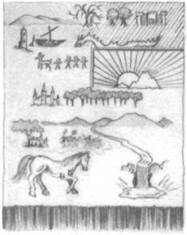
Gromden's daughter Threnody. Threnody committed suicide soon after her marriage. Yin-Yang were two halves of the same Magician's personality. He was King of Xanth four hundred years after King Roogna, ending the dynasty that used the Castle as the center of government. Yin, Magician of light who must always use magic positively and tell the truth, was forced to serve the half known as Yang, Magician of darkness, who always uses magic negatively and lies, after Yang won the competition for the throne set by King Gromden. After Yang became King, Castle Roogna stood empty, for Yang preferred decentralized government. Most spells and enchanted objects in Xanth date from his reign, for his talent was making spells which, in spite of his nature, are neutral, because magic is a matter of symbolism and intent, and objects have no intent. All object spells are his, even the ones before he lived, like the Gap Forget Spell, and the others in the royal arsenal.
Xanth declined after Yang was gone, for he had managed to destroy its focus.
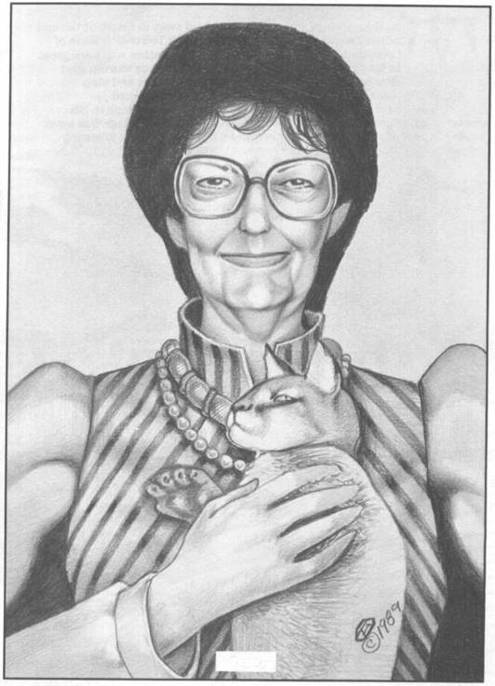
 he Storm King (name
unknown) held sway in Xanth at the end of the Twelfth Wave until
just before the Thirteenth Wave of Colonization. His power to
control the weather was once great. In his prime he was able to
conjure enormous storms, part clouds in the midst of hail, call up
hurricanes and stop tornadoes, but in his old age, the talent
weakened considerably. He could barely summon a light zephyr. His
center of government was in the North Village. Though the village
was never again the seat of power of Xanth, it remained important
in the following reigns.
he Storm King (name
unknown) held sway in Xanth at the end of the Twelfth Wave until
just before the Thirteenth Wave of Colonization. His power to
control the weather was once great. In his prime he was able to
conjure enormous storms, part clouds in the midst of hail, call up
hurricanes and stop tornadoes, but in his old age, the talent
weakened considerably. He could barely summon a light zephyr. His
center of government was in the North Village. Though the village
was never again the seat of power of Xanth, it remained important
in the following reigns.
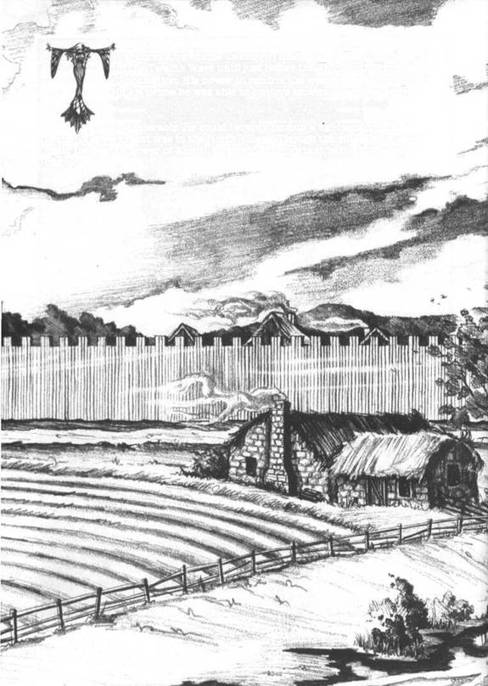
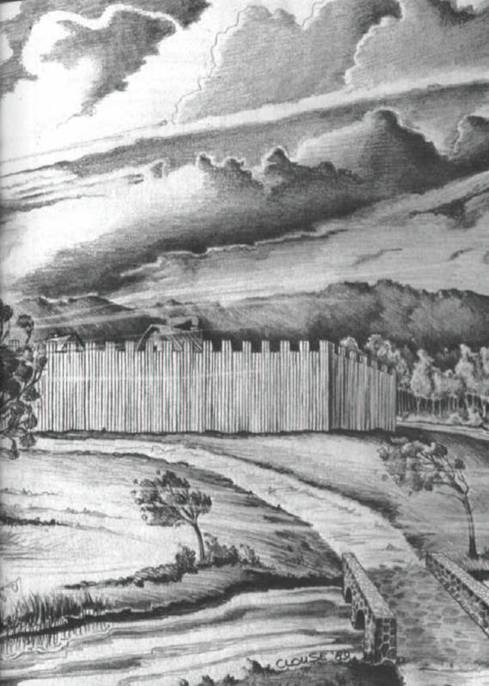
 uring the
Thirteenth Wave, Trent the Transformer, formerly known as the Evil
magician, was the King of Xanth. He was exiled
from Xanth in his twenties for trying to take the throne by
treachery. He spent the next two decades in Mundania rethinking his
motivations and establishing a conquering force. He married a
Mundane woman and had a son by her, but both the wife and child
died of a mysterious flu virus. Thereafter, Trent devoted himself
to reentering Xanth and putting himself on the throne, but this
time by
uring the
Thirteenth Wave, Trent the Transformer, formerly known as the Evil
magician, was the King of Xanth. He was exiled
from Xanth in his twenties for trying to take the throne by
treachery. He spent the next two decades in Mundania rethinking his
motivations and establishing a conquering force. He married a
Mundane woman and had a son by her, but both the wife and child
died of a mysterious flu virus. Thereafter, Trent devoted himself
to reentering Xanth and putting himself on the throne, but this
time by
reasonable if not peaceful means.
He was helped indirectly in his pursuit by Bink.
Few people know the actual details of Bink's talent. He was exiled by the Storm King under the old custom for having no demonstrable magic. His talent is purely defensive and probably the most complex in Xanth. Bink cannot be harmed by magic. Even when an enemy detects the nature of his talent, it will still conspire to protect him. At times, his magic has to make value judgments on what will best keep him from harm. Only a purely physical
attack without the use of magic can hurt Bink.
Bink was eventually convinced of the validity of Trent's motives and willingly gave him his help. When the Evil Magician turned Good King Trent
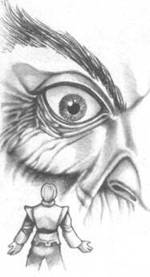
ascended the throne and judged the ramifications of Bulk's talent, he made Bink the Royal Researcher of Xanth. Bink's job would be to investigate and discover the source of magic of
Xanth and bring his findings to the attention of the King (see Time of No Magic). The Demon X(A/N)th has bequeathed to all Bink's descendants the full magical talents of Magician-caliber, though neither he nor his family knows that. He has continued to explore and examine magical curiosities throughout Xanth, and also acts as a liaison between Xanth and some parts of Mundania. Chameleon is from the Gap Village. Her talent is phasic. During a quarter of the month, she appears as Wynne, supremely beautiful, sweet, and hopelessly stupid. Her beauty fades as her intelligence increases. When she is completely average in both looks and brains, she is known as Dee. The metamorphosis continues until she is
absolutely ugly, bad-tempered, and brilliant. Her name in that phase is Fanchon. During the final fourth of the month, she changes to Dee on the way through to becoming Wynne again, though each time Wynne is beautiful in a different way. Chameleon has no control over her talent. Like the animals of Xanth, she appears to be magical, rather than to have controllable magic. She married Bink, who enjoys her constant variety.
The Sorceress Iris, Mistress of Illusion, is capable of creating the image of anything she wants to, down to accurate sound, smell, taste, and, to a limited
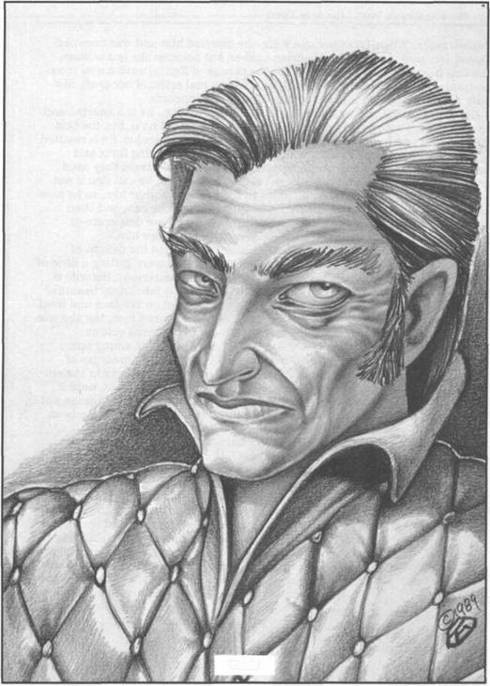
degree, touch. When Trent became King, she married him and was crowned Queen. Her power is genuine Magician-caliber, but because she is a woman, she was frustrated in her ambition for the throne of Xanth, until a new interpretation was made of the office of King. Iris is a real artist of her craft. She puts the most detailed touches to any illusion she concocts.
Good Magician Humfrey is the Magician of Information. He is a gnarled and bent old dwarf with a bad temper. No one knows how old he is, but the best guess is over one hundred years. Humfrey is an inquiring genius. He is reputed to know a hundred spells, all of which are used for uncovering facts and accruing knowledge. Many people approach him with Questions they need answered. They figure that if he doesn't know the Answer, he can find it out. Humfrey is a hermit by nature. He hates to have people bother him, so he puts as many obstacles in the way of potential Querents that he can, and then charges a year's service for one Answer. Only those who are desperate or serious enough about their Questions will get through to see him.
Early in the reign of King Trent, Humfrey got married, to the delight of everyone who had been in his service, who felt that they were getting a little of their own back by seeing Humfrey enter the bonds of matrimony. His wife is the Gorgon, a nymph from the Region of Madness. She is fabulously beautiful and shapely, but no man before Humfrey had ever gazed on her face and lived. Anyone who looked at her was turned to stone. She admired men, but she was lonely because her talent always made statues out of potential suitors. Humfrey solved the problem by making her face invisible, the empty space where her head should be is surrounded by her hair, which is made up of hundreds of tiny, hissing snakes. Like her sister the Siren, the Gorgon's talent was directed only at men. But when she matured, so did her talent, until it affected women, too, and even other living things. Had the Good Magician not made her face invisible, all living things around the Gorgon would have been stoned.
After making the Gorgon serve a year waiting for the Answer to the Question she asked ("Would you marry me?"), Humfrey married the Gorgon.
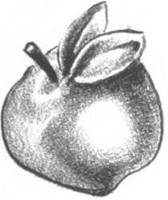
Humfrey had always been using the water of the Fountain of Youth to keep himself a crochety hundred years old, but after his wedding, he youthened himself enough to father children. Hugo, first child of Humfrey and the Gorgon (HuGo), has the unimpressive ability to conjure fruit. When enhanced by Ivy, Hugo's talent improved immensely, as did his looks
and intelligence. Though each enhancement is temporary in effect, a little more improvement
accrues each time. With Ivy's help, Hugo's intellect and fruit-conjuring talent stopped a
wiggle swarm.
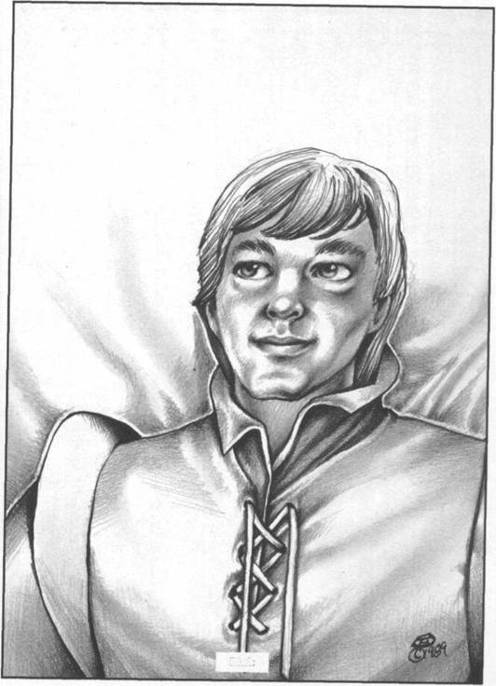
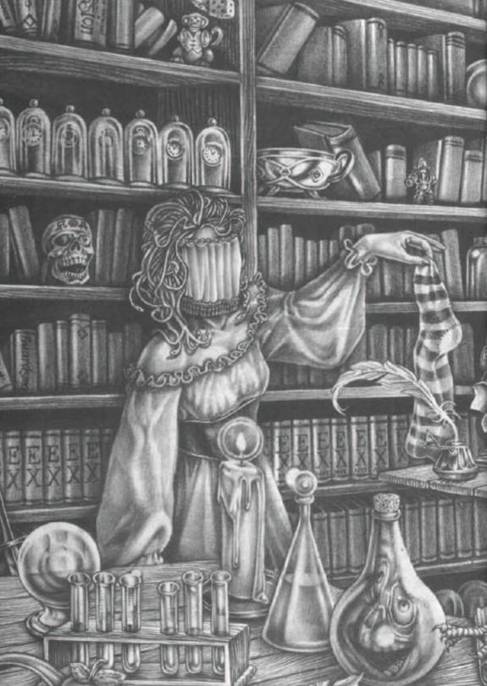
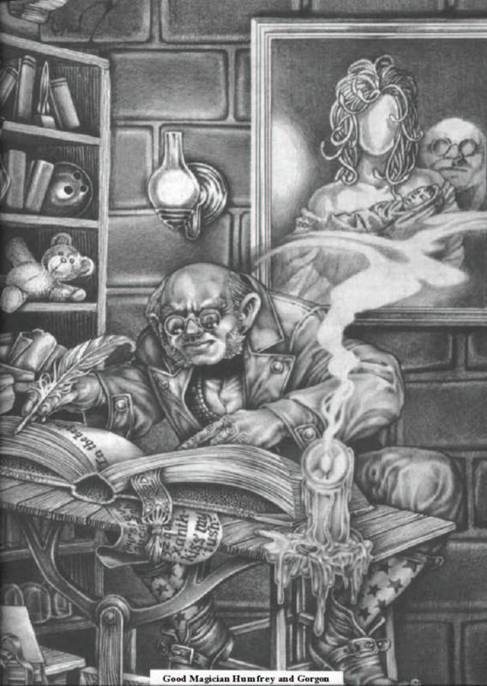
 he Fourteenth Wave:
Dor, the son of Bink and Chameleon, is the Magician of
Communication with the Inanimate. Any nonliving thing can speak
with him. Dor is married to Irene, daughter of Trent and Iris. Dor
traveled into the Castle Roogna Tapestry to visit the era of King
Roogna. His intention was to secure a Zombie Restorative from the
Zombie Master so that the zombie Jonathan could live again. While
he was there, he and his companion Jumper (q.v.) heroically
assisted Roogna in his efforts to repulse the Fifth Wave. When King
Trent abdicated after the attack of the Horseman, Dor ascended the
throne.
he Fourteenth Wave:
Dor, the son of Bink and Chameleon, is the Magician of
Communication with the Inanimate. Any nonliving thing can speak
with him. Dor is married to Irene, daughter of Trent and Iris. Dor
traveled into the Castle Roogna Tapestry to visit the era of King
Roogna. His intention was to secure a Zombie Restorative from the
Zombie Master so that the zombie Jonathan could live again. While
he was there, he and his companion Jumper (q.v.) heroically
assisted Roogna in his efforts to repulse the Fifth Wave. When King
Trent abdicated after the attack of the Horseman, Dor ascended the
throne.
Irene, present Queen of Xanth, has as her talent the Green Thumb. She can make any plant grow from seed to maturity by ordering it. Her talent was not considered to be of Magician-caliber until her first pregnancy when it was enhanced by her unborn daughter, but she reigned as the eighth temporary King of Xanth during the Horseman's incursion. Irene is as beautiful as a nymph, and has fine legs, which she showed off in tantalizing glimpses during her youth. The color of her panties was a subject of much speculation among the males of the court.
Ivy is the eldest child of Dor and Irene. Her talent is that of Enhancement, a powerful and subtle magic similar in potency to her grandfather Bink's. Anything she enhances increases in the qualities she chooses. If she feels that a monster is nice, it will become nice. If she enhances the blueness of a flower, it will become more blue than any other flower that ever bloomed. She is cute and curious about everything, and always puts herself in the way of
adventure. Her mother, Irene, grows tiny ivy plants for her and Dor to wear so they always know Ivy is all right.
Dolph is Ivy's younger brother. He is the Magician of Shape-change. His talent is similar to that of their other grandfather, Trent, whose magic is Transformation of Others, but directed toward himself instead of toward other living things. Although he frequently disagrees with his big sister, they love each other, and have in-jokes between themselves. Phlod Firefly, Prince Dolph's alternate identity in dragonform, is his name spelled backwards. The designation came from a game that he and Ivy played when they were children. He has also gone about in the form of Trilobyte, an armored swimming fossil arthropod with extra memory, when he visited Draco Dragon's nest. He has also taken the shape of a fire-breathing dragon, a werewolf, a tree, a tiny fly, and a food-conserving ant.
Grey Murphy is the son of Magician Murphy and Neo-Sorceress Vadne. He has hair-colored hair and neutral eyes, and his first eighteen years were dull even by Mundane standards, but he's a decent guy. He became betrothed to Ivy in the middle of a hate spring. His Magician-caliber talent is the Nullification of Magic, but his wisdom and native ability for problem solving set him to fill an important gap in Xanth. He can show many complex expressions on his face, such as I'm Saying This For Your Own Good, Now You Know This Is Foolish, and This Is Not The Time To Disabuse You Of Notions.
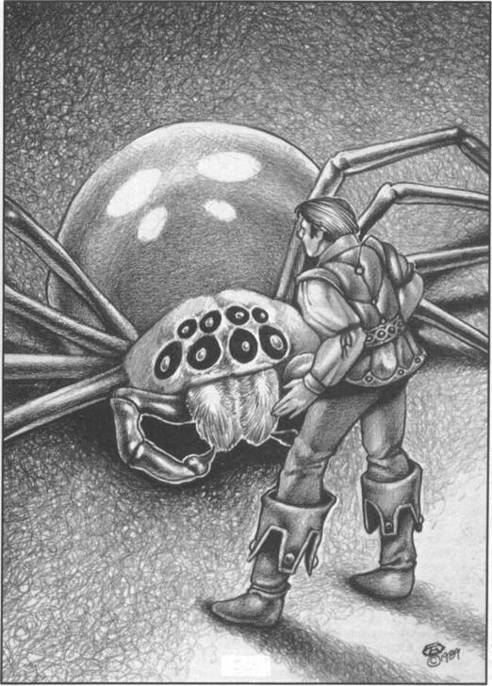
HARPIES AND
GOBLINS
 he higherarchy and
lowerarchy: harpies and goblins are traditional enemies, since
neither can suborn the realm of the other. The goblins hold sway
under the earth and in darkness, the harpies hold sway above it and
in day. In the beginning the part-human races needed to join their
strengths against the early wavers, and sometimes even shared the
same caves. In time, the goblins grew greedy for the harpies' space
in the caves
he higherarchy and
lowerarchy: harpies and goblins are traditional enemies, since
neither can suborn the realm of the other. The goblins hold sway
under the earth and in darkness, the harpies hold sway above it and
in day. In the beginning the part-human races needed to join their
strengths against the early wavers, and sometimes even shared the
same caves. In time, the goblins grew greedy for the harpies' space
in the caves
and drove them out.
Goblins are ugly humanoids half the height of a man, with large hands and feet. Their heads are as hard as stone, so it is impossible to hurt one by coshing it, but their hands and feet are very soft. They prefer to attack a victim in large numbers and under unfair circumstances. All goblins are cowards, and have nasty dispositions. No fewer than four or five will set upon a single man if he wanders accidentally into their demesne. Most modern goblins fear the light, but some still go about in full daylight, such as the Goblinate of the Golden Horde, the meanest gang north of the Gap. Goblins like to eat candied insects and bugs, or indeed any kind of meat.
The goblins blame the harpies for blighting the sight of the female goblins so they were only attracted to the weak and ugly males. Goblins claim they used to be the handsomest, smartest, strongest and bravest of the half-human races. Because of the harpy curse, in the long run only the goblin-wimps were able to find wives, so there is nothing left in the goblin caves but beautiful females and ugly males.
The harpies, on their side, are just as rude and cruel as the goblins. They blame the goblin women for stealing the harpy cocks away using the lure of their limbs. The counterspells to stop the feud were not invoked until the early Fifth Wave, after a human intervened.
Harpies have the heads and breasts of women; and the bodies, great greasy wings, and short ugly legs of vultures. They come from the love-spring cross of
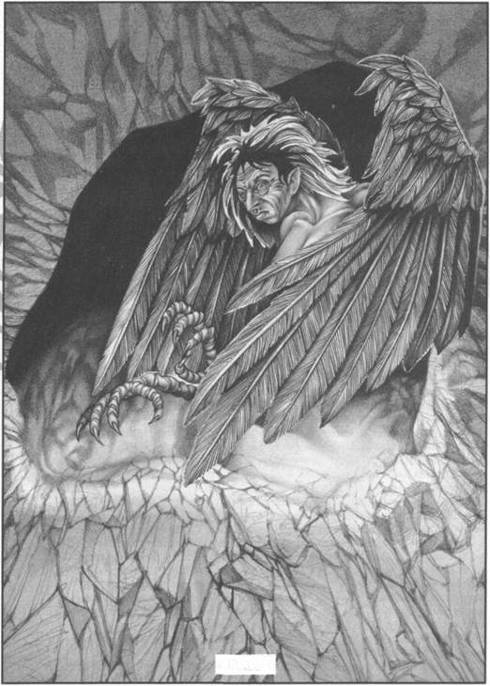
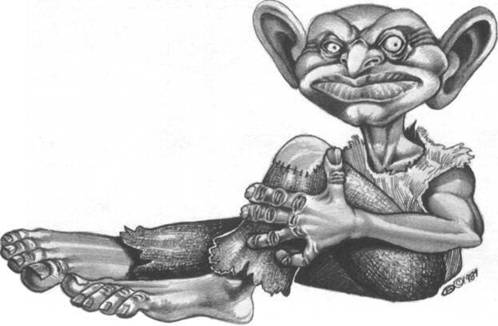
a human and a vulture, though history does not record which sex was what species. They can fly, and their talons are sharp but usually chipped and stained from lack of personal care. They prefer the taste of meat, and will eat the entrails of humans if they can.
Most harpies are ugly and dirty, but the youngest females are beautiful and clean. It is only after decades of bitter and abusive spinsterhood that they begin to neglect themselves. A few handsome male harpies exist, but far and away (the best way to view harpies) the greatest number are female. When no male harpies have been hatched, the females propagate the species by mating in alternate generations with men and with vultures. Each flock is ruled by a Queen. All males are considered to be princes, because there are so few of them. The males must obey the Queen, but the females are reluctant to alienate the few males they have by denying their wishes.
They live in grimy holes dibbled into the sides of cliffs, and use their dung for building. They save unhatched eggs as weapons, for harpy eggs explode in an unbelievable stench, and spray mess all over the landscape.
It was discovered by Glory Goblin and Hardy Harpy that goblins and harpies, half-humans all, have "half-talents." When the appropriate pair of harpy and goblin join up, they can do magic. Glory's and Hardy's half-talents are for invisibility. The two species are negotiating an armed truce for exploring their new powers. They feel that humans have had a monopoly on magic too long, and it's their turn for a share.
The thing to remember is that Xanth was not always magic. There was a time before Demon X(A/N)th arrived when it was Mundane, unpleasant as it may be to mention this. When the Demon brought the magic, and it started filtering out into the surrounding region, the Mundane creatures and plants began to change. Many retain some semblance of their original natures, but often only their names suggest it. For example, shoe trees once supported shoes instead of producing them.
Now, with the magic strong, there is constant change. New species develop, and old ones merge. Thus, after many hundreds of years, the species of winged centaurs is arising, and Gloha the winged gobliness is born of a goblin-harpy union. There is no telling what may happen in the future!
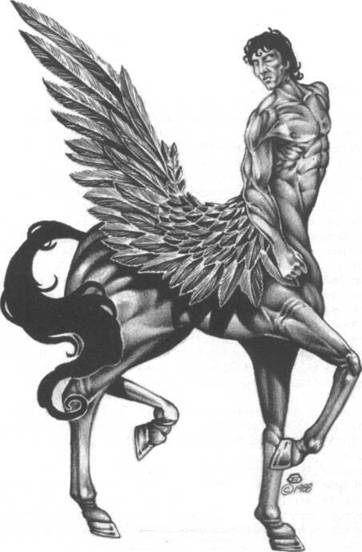
DEMONS
 emons are not very
attached to their shapes. They can change their forms into anything
they wish. A demon can turn into a cloud of vapor, but it can't
remain in that form for long. It must be solid at least ninety
percent of the time, or lose cohesion permanently.
emons are not very
attached to their shapes. They can change their forms into anything
they wish. A demon can turn into a cloud of vapor, but it can't
remain in that form for long. It must be solid at least ninety
percent of the time, or lose cohesion permanently.
Because of their shapeshifting ability, it is difficult to hurt demons, and nearly impossible to kill them. They can become vapor to avoid a blow; or turn to steel and dent whatever is striking out at them.
A demon in its natural form is easy to distinguish. Its hind feet are hooflike, it has a long tail with barbs at the tip, and fiery, glowing eyes. Demons are interested in the sensual pleasures, and seek to share them with other creatures, willing or unwilling. Stories exist of mortals who have enjoyed the company of demon lovers. Demons can mate with other species and produce children who have characteristics of each parent. Threnody, daughter of the human king Gromden, was half-demon. She had a human's magic talent, and possessed some demon-like traits of personality.
Most demons have pointed horns, though Beauregard, Humfrey's once bottled advisor, has only vestigial ones. His tail has a soft tuft instead of a barb, and he wears glasses. Nevertheless, he is a powerful demon in the Demon Realm. Fiant, a very male demon who harassed the half-nymph Tandy, has sharp horns and a many-barbed tail. Some demons, like Metria, have only the glowing eyes, dusky skin and pointed teeth to show that they are of the demon kind.
Demons have far more sensitive hearing than humans do, and are especially bothered by the sound of hummers. In seeking to ruin the Kiss-Mee River valley to drive away its inhabitants, they managed to make it unliveable for their own kind.
They can phase in and out through walls. Very little can keep a demon out of a place it wishes to go. If one senses that it can make mischief, it will come back again and again unless physically or magically prevented. Fiant was kept from bothering Tandy again by being stuffed into the gourd, where his soul was exchanged for hers. Demons enjoy pleasing themselves at the expense of other beings.
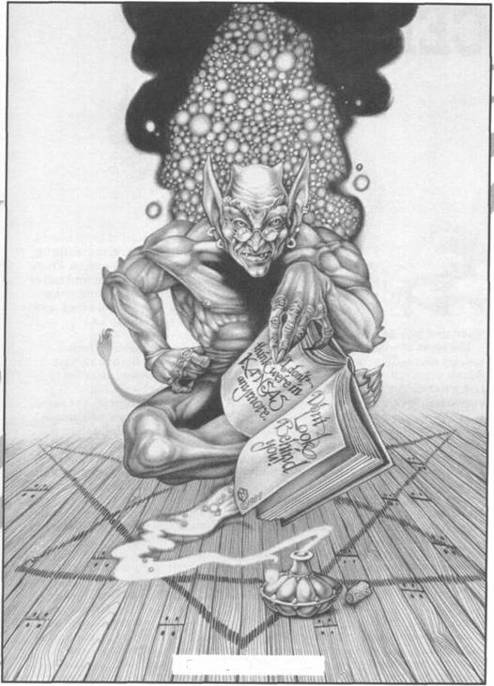
Beauregard the Demon
CENTAURS
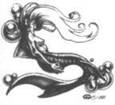 everal crossbred
races in Xanth are descended from horses. Foremost among them are
the centaurs. From the waist up, centaurs have the heads, arms and
chests of humans. From the withers down, they have the four-legged
body and tail of a horse. Their hooves are magically hard, to
prevent chips and breakage. The centaur race was engendered many
ages ago by three human men and their mares who had wandered into
Xanth and drunk from a love stream.
everal crossbred
races in Xanth are descended from horses. Foremost among them are
the centaurs. From the waist up, centaurs have the heads, arms and
chests of humans. From the withers down, they have the four-legged
body and tail of a horse. Their hooves are magically hard, to
prevent chips and breakage. The centaur race was engendered many
ages ago by three human men and their mares who had wandered into
Xanth and drunk from a love stream.
The waist of a centaur is remarkably supple, as he might need to turn around where there isn't room to back his long horse body. Both male and female centaurs stand taller than human folk. The fillies are accustomed to being stared at by human males, for their mammary development is considered spectacular by human standards. Centaurs do not place the same stigma on natural behaviors, such as sex, nudity, or evacuation that humans do. They have other taboos which humans do not often understand.
Centaurs are fierce fighters and strong-bodied. Even a filly can hoist the weight of her equine body using only her human arms. Their faces usually show their half-heritage in the length of the nose. Centaur ladies let their hair grow down all the way to the saddle area, and wear their tails long, too. Beauty, which is a less important characteristic among centaurs than among humans, is considered more in the light of their horse-halves. Chester Centaur has a homely face, but an exceedingly handsome posterior. His wife Cherie has a beautiful human half as well.
They run in herds, and rule themselves by a council of elders which thoroughly discuss important matters and make accordingly wise decisions. Centaurs once seemed to age at approximately a quarter of the speed humans did, so that a centaur colt of twenty was still just a tot. But time can be odd in Xanth, and it later was apparent that no such ratio can be maintained. Cherie's foals Chet and Chem aged at the same rate as Chameleon's foal, uh, baby Dor, and Chem's foal Chex, being a crossbreed between a centaur and a hippogryph, aged between the human and animal rates. Thus Chex was mature and ready to mate while the human Ivy, four years older, was still a child. It's hard to tell how rapidly Chex's son Che will age, as he hasn't been
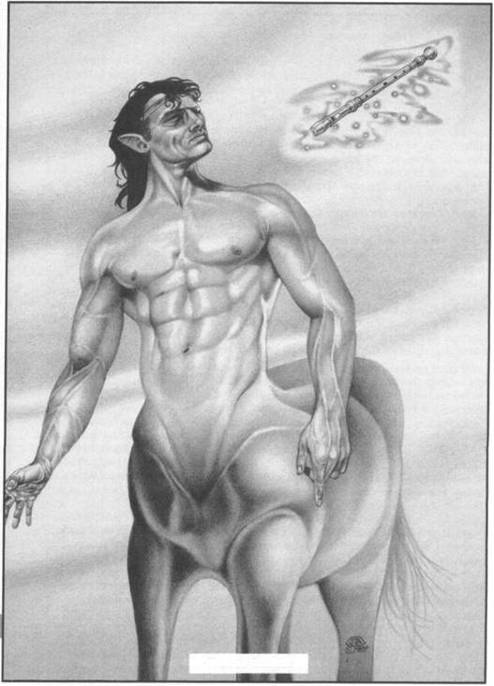
Chester Centaur
foaled yet, but the human rate seems likely. Centaur physicians are called vets.
Centaurs, though partly magic in origin, have full magical talents. However, polite centaur society considers magic to be obscene, so few of their talents have been described, let alone realized by their possessors. They use a croggle test (a pun on the Mundane Coggins test for horses, and fans who get croggled -- see fantasy fan under Magical Things of Xanth) to discover whether a centaur has been infected by magic. Some are even considered Magiciancaliber, such as Arnolde the Archivist, a hundred-year-old Appaloosa centaur, who now serves as the ambassador of trade between Xanth and Onesti. His talent, that of an invisible radius of magic which he can carry outside Xanth, is only observable in the absence of magic. His Centaur Aisle is of considerable use beyond the borders for any traveler who wants to employ his talent abroad. Centaurs are usually the most wise and logical of creatures. It is curious that they would not accept extant facts about themselves.
Herman the Hermit, a hero of Xanth, was a centaur of great wisdom and courage. He gave his life to save the land from the wiggle infestation in the days of King Trent. Herman could summon will-o'-the-wisps, mischievous dancing lights that could lead one into the wilderness and lose one there. He was an outcast from his own people because he recognized his talent. His nephew, Chester Centaur, possesses the ability to manifest a sweet silver flute which plays beautifully with no hand or lip touching it. Herman was the first centaur to realize that centaurs had been in Xanth so long they had become a natural species, and so were able to be born with talents.
Chester's wife Cherie grudgingly acknowledges that centaurs have magic, but refuses to come to terms with her own ability. Cherie is otherwise an excellent tutor to young Dor, who is undoubtedly a Magician. (Obscenity is tolerated in humans, who are considered a lesser species by the centaurs.) Their foals, Chet and Chem, make use of their magic, as it is not considered anathema among the humans with whom they associate. Chet can make large
things small, but he can't reverse the process. The most useful facet of his talent is that he transforms rocks into calxes, which are used in calculus, so the more rocks he shrinks, the more the effect of his magic grows. Chem's talent has more widespread uses. She can manifest, in thin air, a map of any terrain she has seen.
The Centaur Isle is the center of learning in Xanth. Even the least intelligent centaur is more brilliant than any human. Scholarship is valued in centaur society. Chester, who seems to be a fool in most other matters, is an expert in mathematics, specifically horsepower applications. Most Xanth children, if they are able to, attend centaur school to get their basic education. Hobbies and other occupations are valued for letting the mind rest between studies. Centaurs play chess and other games of strategy, and practice useful handcrafts. A popular game among centaurs is people-shoes, played with stakes and the fruit of a shoe tree.
Centaurs have a high regard for honor, and a centaur's word is inviolate. They are independent in nature and have perfectly developed powers of observation. They are the humans' most important allies.
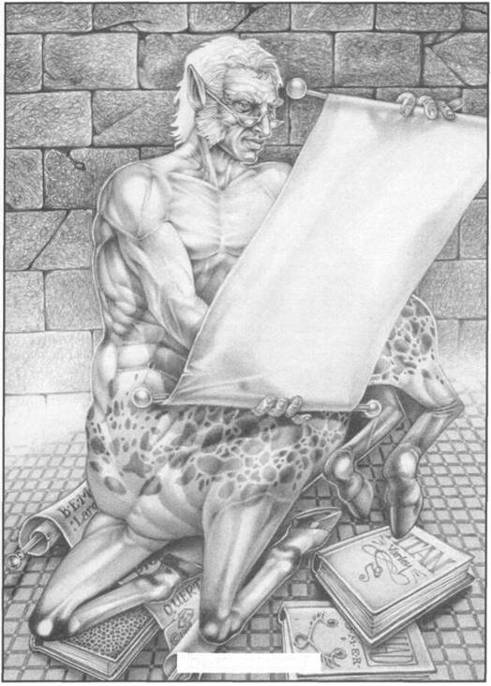
Arnolde the Archivist
OTHER RACES OF
EQUINE DESCENT
 egasi are handsome
winged horses who graze in the treetops. They are members of the
winged monsters, a loosely organized multispecies group led by the
centaur Cheiron.
egasi are handsome
winged horses who graze in the treetops. They are members of the
winged monsters, a loosely organized multispecies group led by the
centaur Cheiron.
Hippocampi are sea horses with the head and forefeet of horses and the tails of dolphins. The forefeet end in flippers rather than hooves, and the tail curls in a muscular loop when at rest.
Night mares appear to be nothing but sleek, pretty Mundane equines, solid black even to their hooves, except that their eyes glow faintly, and their hoofprints resemble the face of the moon.
Their home is the gourd, where they are led by the Night Stallion, Trojan, who is also known as the Dark Horse. Trojan commands all the disembodied beings of the gourd, for he rules the realm of dreams. It is the responsibility of the night mares to carry dreams crafted within the gourd to sleepers of the outside world who need them.
Trojan, who has power over all dreams, is really a prisoner in the gourd. He cannot visit the solid world as his mares do, unless he pays for it with the souls of those who lost them in the gourd. He won the job of Dark Horse by defeating the last King of Dreams to hold the office. When Smash Ogre bested Trojan, the Night Stallion offered to make him Dark Ogre in exchange for being set free, but Smash refused.
To uneasy sleepers, the night mares look like huge nebulous monsters with gleaming white eyes and glinting teeth, for they bear bad dreams to those who deserve them, or who need them when solving problems. The purpose of night mares is to force a dreaming mind to suffer the pangs of conscience or regret, the realization of the consequences of evil. The immortal night mares "guard constantly against spiritual degradation" (Ogre, Ogre, p. 258). For example, a misogynist, a man who hates women, was once visited with a horrible bad dream of being loved to death by a score of beautiful mermaids. To some, that
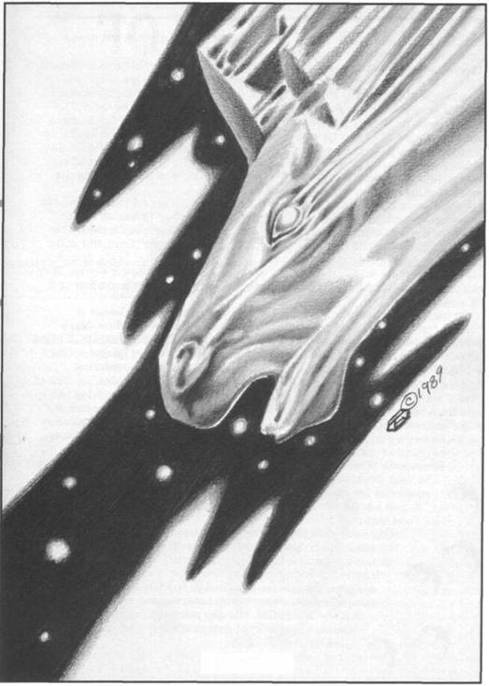
Night Mare
may be a wonderful dream rather than the gift of a night mare, but it was appropriate to prod that dreamer's conscience.
Night mares do not have souls. Those who gain souls soon become inefficient. It is not in the nature of souls to be truly brutal, as a night mare must be on occasion. Those who earn souls turn them in to the Night Stallion for storage and bonus credit for extraordinary service. A night mare must be careful to frighten with the fewest possible images so that the dreamer will not learn to consider dragons or other dangers passe. Night mares are immortal until they are foolish enough to keep a soul. Then they assume the liabilities of mortality, as Mare Imbrium did. Some may eventually get bored with their jobs and seek to change occupations. If they choose, they may mate and foal and turn the position of night mare over to their offspring.
A night mare is not actually solid while outside of the gourd, though one can be ridden by someone who is asleep. A rider need not fear falling off a night mare, for if she consents to carry you (and the price is high: half a soul), the mare will always be the right size. Night mares cannot speak aloud, but make dreamlets of a nonfrightening nature in the mind of an awake being, and those say what the mare wishes to express. They only come when one is asleep. They can phase through solid matter under cover of darkness, be it a shadow or a smokescreen.
On each mare's hoofprint, that sea which was named in her honor is highlighted: i.e., Mare Crisium (called Cris or Crisis), Mare Imbrium, Mare Humerum, Mare Nubium, Mare Frigoris, Mare Nectaris, Mare Australe. A night mare's moon hoofprint fades as the moon changes into lesser quarters. She will tend to slip because of the lack of traction unless she concentrates.
Mare Imbrium, known as Imbri, whose name means "Sea of Rains," or "Sea of Tears," was once a night mare, and an artist at her craft. After receiving half a soul from Smash Ogre, she was transferred to daydream duty by her sire, the Night Stallion. It was a kindness, for she had always wanted to see the rainbow, but also extra duty, because she was now expected to act as liaison between the Powers of Night and the Powers of the Day during the rise of the Fourteenth Wave. She defeated the Horseman by sacrificing her body in the Void. Because she had a soul, she was restored to life, and continues her career as a true day mare. She is perhaps better suited to this job, for she has a gentler nature than she needs for handling bad dreams. Day mares are happy, careless creatures who do not work at the same frantic pace as their nocturnal counterparts. If their dreams are misplaced or forgotten, or if a double supply is delivered to a single dreamer, it doesn't matter. Daydreams are pleasant fancies, designed to rest the mind in contentment. Unlike a night mare, a day mare has a soul,
but she is invisible. The day mares are ruled by the Day Horse, a magnificent golden stallion, who is a very casual leader.
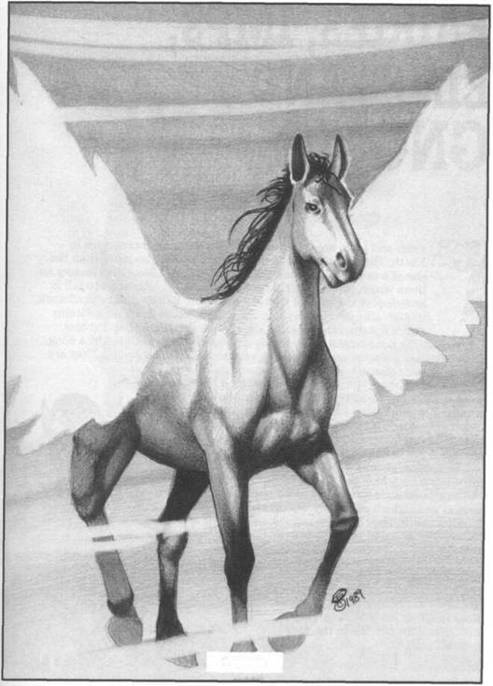
Pegasus
FAIRIES, IMPS,
ELVES AND
GNOMES
 airies and imps are
the smallest of the humanlike creatures in Xanth. They are delicate
and dainty, measuring no more than the size of a man's hand. Their
wings have colorful flowerlike images on them which sometimes
change. Fairies who are destined to fall in love display the glow
of love at first touch. Fairies do fine craftwork, though always on
a very tiny scale. Imps make small magic items out of ephemeral
materials, such as mirrors from soap bubbles.
airies and imps are
the smallest of the humanlike creatures in Xanth. They are delicate
and dainty, measuring no more than the size of a man's hand. Their
wings have colorful flowerlike images on them which sometimes
change. Fairies who are destined to fall in love display the glow
of love at first touch. Fairies do fine craftwork, though always on
a very tiny scale. Imps make small magic items out of ephemeral
materials, such as mirrors from soap bubbles.
Elves are the next largest. They live in organized tribes, each led by a King. The elves have been known to come forward to help defend Xanth. They are known by their traditional battle attire, which is always green.
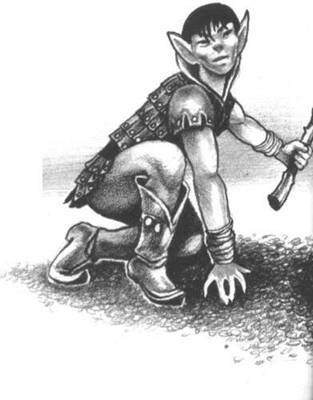
Gnomes are about one third the size of men. They are short-armed and short-legged, leaving their bodies somewhat out of proportion to their size. Female gnomes are called gnomides. Gnomes are extremely forthright, but temper their bluntness with occasional civility. The gnomides are much nicer than their menfolk.
Like goblins, gnomes have been known to eat intruders if they look tasty. Gnomes favor red clothing and battle attire. The hat is one item of wear which no gnome will ever be
found without. They hang on to their hats to keep the aversion spells they wear there, to drive away monsters. One underground village of the gnomes can be reached through a hollow artis-tree in the forests near the site of Threnody's ancient cottage, northwest of Castle Roogna. Their job is mining. They hollow endless tunnels in the rock below Xanth.
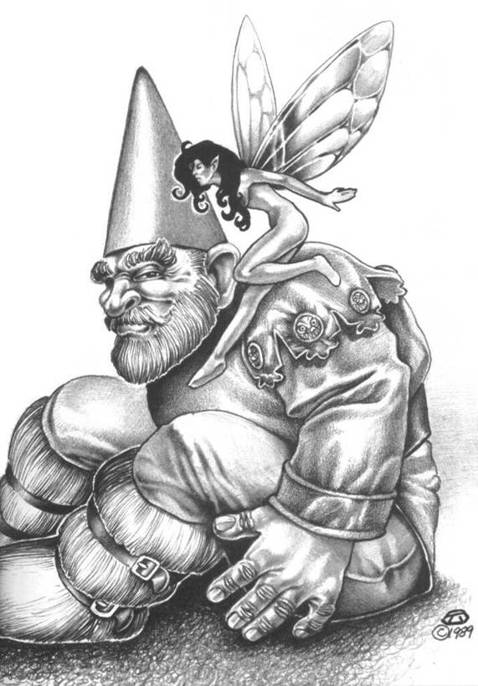
OGRES
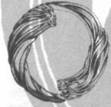 gres talk in simple
rhyme, though unrhymed speech would save them time. When ogres are
hungry for some meat, any flesh is thought good to eat.
Normal-sized ogres stand twice man-height tall, wear their own
shaggy skin and nothing else at all. An ogre's strength is
legendary; no limit to what he can carry. Ogres' arms are like
tough gnarled wood, and their faces do not look even that good.
Hairy muscles knot like the boles of old trees, and they can
wrestle a full-sized dragon to its knees. Even the handsome ones
are grotesque; the ugly ones are a horrible mess. Bad storms and
spoiled food are ogres' delight, they also like to shout and fight.
Their hands and feet are huge, their voices a roar, their manners
are awful,
gres talk in simple
rhyme, though unrhymed speech would save them time. When ogres are
hungry for some meat, any flesh is thought good to eat.
Normal-sized ogres stand twice man-height tall, wear their own
shaggy skin and nothing else at all. An ogre's strength is
legendary; no limit to what he can carry. Ogres' arms are like
tough gnarled wood, and their faces do not look even that good.
Hairy muscles knot like the boles of old trees, and they can
wrestle a full-sized dragon to its knees. Even the handsome ones
are grotesque; the ugly ones are a horrible mess. Bad storms and
spoiled food are ogres' delight, they also like to shout and fight.
Their hands and feet are huge, their voices a roar, their manners
are awful,
and all of them snore. They're so dirty bugs live in their pelt, but skin is so tough raises never a welt. They like jokes that are easy to tell, as ogres don't think very well.
The best of all the ogre bunch, they call he by the name of Crunch. All ogres gnaw on human bone, 'cept Crunch because of Fiend Curse thrown. Crunch is a good cook of vegetarian fare—humans are his friends; let their foes beware. Crunch found she with face like mush, whose smile could make a zombie blush. A Curse Fiend all made up was she, no time to explain when carried off by he. They wed; an ogret arrived with a crash. In ogre fashion, they named him Smash. Smash is half-human, which his folks think is dandy. When he grew up, he married half-nymph Tandy. Ogre courtship is rather rough, so it takes a she who is quite tough.
Ogrets are tougher than little dragons. Except that it is impossible to keep ogrets out of trouble, they are easy to care for. They eat anything, and it is nearly impossible to hurt one.
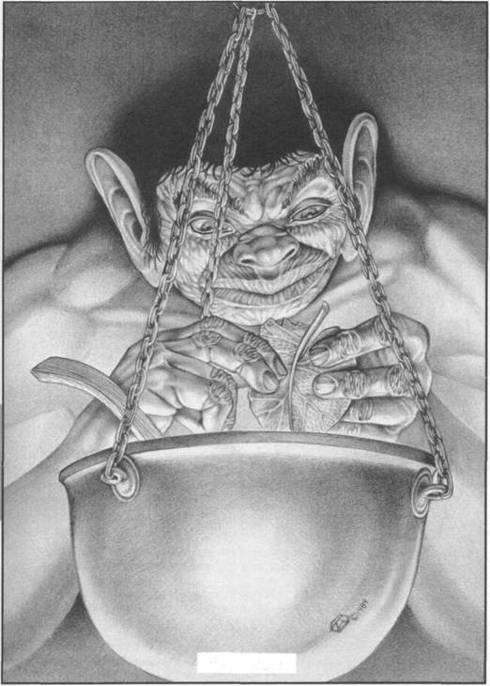
Crunch Ogre
VOLES
 oles are
lemon-shaped furry animals that live in the wilderness to the east
on the Kiss-Mee River, which connects Lake Kiss-Mee and Lake
Ogre-Chobee. A mature vole looks like a quadruped with sharp,
curved claws. Immature ones resemble jointed worms of
oles are
lemon-shaped furry animals that live in the wilderness to the east
on the Kiss-Mee River, which connects Lake Kiss-Mee and Lake
Ogre-Chobee. A mature vole looks like a quadruped with sharp,
curved claws. Immature ones resemble jointed worms of
varying sizes, from tiny to immense. They are the finest excavators under Xanth. It is in the nature of voles to dig quickly and well, creating passageways through rock and soil that will not fall in under any circumstances. Voles and their relatives bore magically through rock. They can leave a tunnel behind them, or no trace of their passage at all, according to their mood, but most leave it solid for the pleasure of digging through the same rock again and again.
The lesser forms of voles are called wiggles, squiggles and diggles. Diggles, the largest, range the huge expanses of bedrock far below the surface; squiggles, the loose earth and stone above; and wiggles, the superhard metal ores and rocks.
Squiggles resemble voles more than the other two breeds do. They have whiskers, and are more flexible in body and mind than the diggles. The squiggles are curious and intelligent. They tend to be solitary, and do not swarm. They have a highly developed society deep underground. Squiggles use directional pebbles to help them find their way, with an increasingly bad taste to tell them that they are going in the correct direction. Often the only sign of their recent presence is a mound of dirt that wasn't there a moment ago.
Diggles look like worms, and are of mere animal intelligence. They move slowly beneath the earth, phasing through the rock without affecting it. They move by elongating and contracting and expanding segments of their bodies. Diggles will work only for a song. Both squiggles and diggles are harmless to surface-dwellers.
Their history records a legend that voles were created by the Demon L(I/T)ho, Maker of Earth, who gave the choicest region to them. Voles, the archetype, were the chosen of L(I/T)ho, and were given free choice of their habitat, and chose the Vale of the Vole. Civilized voles lived in the Gap Chasm before humans entered Xanth. They use artificial hollow claws to protect their own natural claws from wearing down. Such artifacts are occasionally found by human researchers.
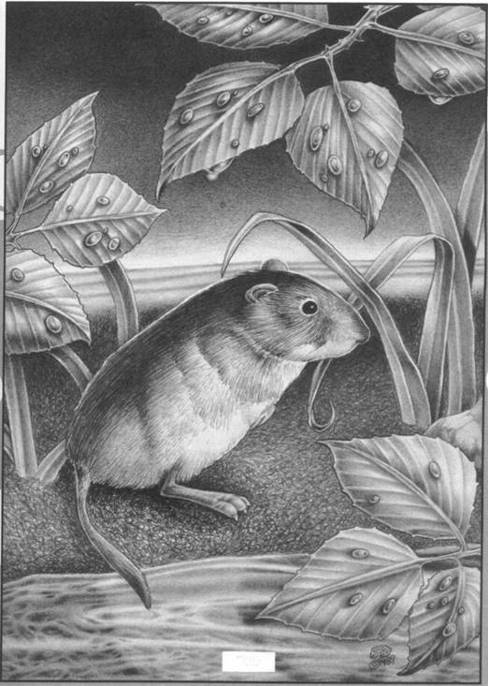
Vole
ZOMBIES
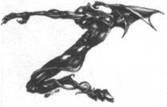 ombies are the
corpses of beings animated to halflife by the Magician Jonathan,
beginning in the time of the Fourth Wave, and then again from the
end of
ombies are the
corpses of beings animated to halflife by the Magician Jonathan,
beginning in the time of the Fourth Wave, and then again from the
end of
the Twelfth Wave on. Zombies lose material continually without losing mass, but generally, they grow more decrepit over time. A zombie makes a very faithful servant, but can only perform the simplest tasks without supervision, because its brain is rotten, and ideas fall right out. Zombies make good guardians, since nothing can hurt what is already dead. They have to be hacked apart to be stopped. And most creatures have a fear of the dead, so even a fairly deteriorated zombie makes a useful deterrent. Most are human, but any species can be reanimated.
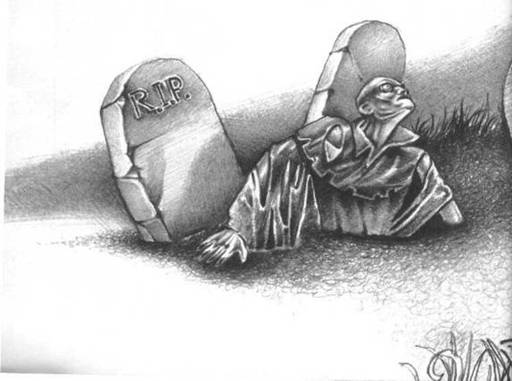
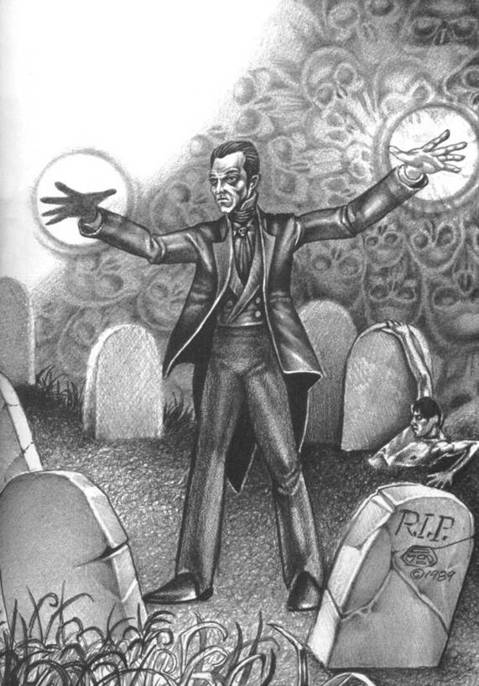
NYMPHS
AND FAUNS
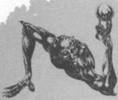 ymphs and fauns are
innocent, pleasure-loving magical creatures, perfect in form, but
possessing no long-term memories or extraordinary intelligence.
Every day is new to them. They quickly forget any hurt they have
suffered, and it is as if any of their number that die or disappear
have never lived. Like the other magical species, they are thought
to have no souls. There are several varieties in Xanth that evolved
from earlier forms present during the early Waves of
Colonization.
ymphs and fauns are
innocent, pleasure-loving magical creatures, perfect in form, but
possessing no long-term memories or extraordinary intelligence.
Every day is new to them. They quickly forget any hurt they have
suffered, and it is as if any of their number that die or disappear
have never lived. Like the other magical species, they are thought
to have no souls. There are several varieties in Xanth that evolved
from earlier forms present during the early Waves of
Colonization.
Nymphs are slim, lovely female creatures who resemble teenage girls of extraordinary beauty. By and large, they have little intelligence, and do not possess souls. Children are not supposed to see them up close, but adult men pursue them, hoping to catch them.
Fauns were the original counterpart of nymphs: handsome, slender young male beings. Dry land fauns, or dryfauns, had greenish hair and dark brown fur on their legs and lower body in the manner of the trees they associate with. On their heads were hornlike tufts of hair, hooked to allow them to draw down fruit from the trees, and their toenails resembled hooves. In time, dryfauns throughout Xanth became satyrs, with entirely goatlike nether portions, and goatlike horns on their heads. Dryads were nymphs of the forest, with green hair and graceful movements. Dryads and hamadryads have become more attached over time to single trees, with whom they share a symbiotic life.
For the naiads, the water-going nymphs, there were naifauns who had flattened flipper hooves and horns which pointed straight up like spears. On their legs they had delicate scales instead of hair. The naiads became mermaids, and the naifauns changed over time into tritons. Their horns disappeared, and they began to carry trident spears. The flipperlike hooves and the naiads' feet became tails like those of fish.
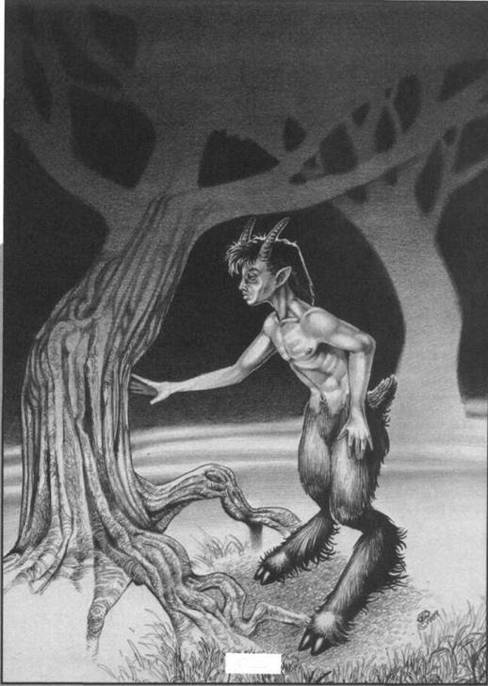
Faun
Oreads and orefauns, nymphs and fauns of the mountains, have all but disappeared in greater Xanth. The orefauns had powerful furry legs with hooves like those of a deer, and hooflike hands which allowed them to run easily up the sides of mountains. Their horns were curled like those of a Mundane ram.
Nerefauns and nereids lived in the sea. They had webbed hands, scales along the lower halves of their bodies, and flipper feet which evolved into the powerful tails of sea fish. They have become merwomen and mermen. Merwomen are more mature than mermaids, and are somewhat better fleshed. They are excellent housewives. Merwomen remain youthful in appearance throughout their long lives, but the males grow old and grizzled unless they counter the ravages of time with a protective magical charm, such as a firewater opal.
Merfolk can interbreed with other races, to produce halflings, which are brought by the storkfish. Merwomen frequently mate with sailors after their mermen have lost interest in stork-summoning. Some sailors who are reported drowned are happy beneath the sea, protected by their merwomen lovers, and do not want to go back to dry land. There is one valley in Xanth where the various kinds of nymphs and fauns live as they did in the distant past. There they are protected by a Monster Under the Bed named Snortimer, who settled there to find romance.
Nymphs and fairies are believed to have no souls. They are magical beings who exist because of X(A/N)th's magic. Nymphs are capable of mating with humans and producing offspring. Tandy, daughter of Crombie the soldier and Jewel the Nymph, is half-human, and so possesses a half-soul. Tandy's magical talent is her ability to throw tantrums, which pack enough punch to knock out a demon.
The Siren, whose magnificent singing voice and magic dulcimer lured many men to their doom in the face of her sister the Gorgon, is also a nymph. Once deprived of her magical musical instrument, she became merely a mermaid of spectacular beauty who offered no compulsion to men but her normal nymphly charms. When she wishes to, she can separate her tail into a pair of human legs. She married a triton named Morris the Merman who lives in the Water Wing. They have a son, Cyrus, who can also change from triton's tail to human legs at will.
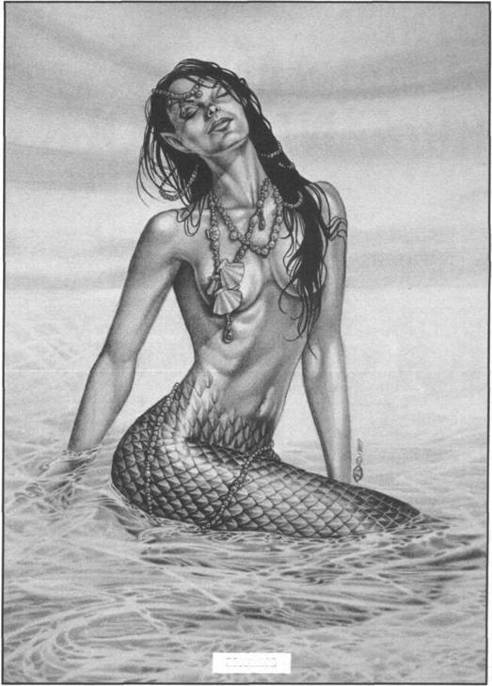
Mermaid
OTHER
HUMANS AND
HUMANLIKE FOLK
 illie the Ghost:
Millie's talent, which provoked her first death,
illie the Ghost:
Millie's talent, which provoked her first death,
is Sex Appeal. She came from the West Stockade, a very small
community. As a slim, lovely young maid of seventeen with
long, golden hair, Millie left the employ of the Sorceress Tapis
to seek employment as a chambermaid at Castle Roogna.
There, she was ensorcelled by Neo-Sorceress Vadne, who
molded Millie's body into the form of a book, The Skeleton in
the Closet, thereby squeezing the life out of her. Millie spent 800 years sadly
haunting the abandoned Castle Roogna She was restored to life with the help
of Bink and Humfrey. The stress of being a ghost for 800 years darkened her
hair to black. It soon grew out blond again, after she was once again fully
alive.
After her restoration, she spent twelve years as maid and nurse to Dor until
she married Zombie Master Jonathan and moved with him to Castle Zombie.
They have twins, their son and daughter, Hiatus and Lacuna. Both of them
inherited the lanky physique of their father, so at a distance it is difficult to
tell which is which.
Their children have talents that seem positively intended for mischief.
Lacuna can change printed text to read anything she wants. Hiatus's talent of
Manifesting Sensory Organs allows him to give the walls ears.
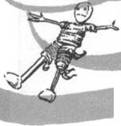
Grundy the Golem was once formed of bits of string, clay
and wood, but began to change into an elf when he learned to
care. The final alteration to living reality was done by the
Demon X(A/N)th when Grundy fulfilled a challenge to give
X(A/N)th an advantage over his fellow demons, which he did
by teaching the Demon about enlightened cooperation, where
giving away advantages helps a player to win in the end.
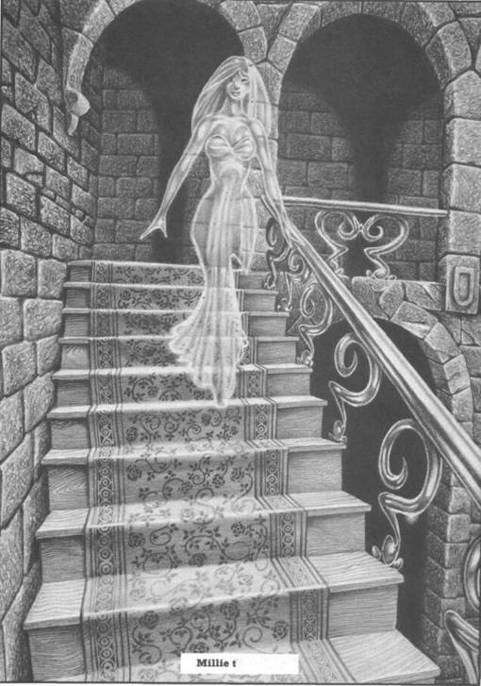
Millie the Ghost
Grundy's magic talent dovetails neatly with that of King Dor's: he can
understand and speak the languages of all living things. There is only one
main language in Xanth, but the various creatures, plants, and organisms
speak it in different ways. Grundy is usually rather tactless, and flavors his
translations with crude insults. He has a natural turn for invective, and his
mouth lands him in as many or more trials as his talent for communication is
capable of getting him out of. He keeps company with Rapunzel, once Ivy's
pun-pal, whose ability to shrink and grow her own body to any size she wishes
brought her down to Grundy's level.
Rapunzel was imprisoned in the Ivory Tower by the Sea Hag until freed by
Grundy and his companions. Her talent is her hair. Rapunzel's tresses are
infinitely long, silky, black at the roots shading to purest white at the ends.
She can compress her hair so it weighs nothing at all while it is bound up on
her head. She is genetically able to make herself larger
or smaller at will, as she is descended from
generations of interbreeding between elves and
humans. Her eyes shift colors. She is a many times
descendant of Bluebell Elf and Jordan the
Barbarian.
Because they were pun-pals before either of
them could write, Rapunzel and Ivy used a magic
box called a tress-ract to correspond with one
another (though it was marked PUNDORA on the
side). Ivy sent her ordinary things like stones
and flowers; in exchange, Rapunzel conveyed
physical puns, such as puncils that write lines on
the air (and can erase same), a messy pig-pun
filled with smelly earth, a puncushion full of
sharp-pointed puns, and delicious hot cross
puns with white icing faces that smile when the
puns are eaten. She also sent Ivy a pair of
Puns and Judy dolls, a pair of snake eyes on
small cubes made of part of the substance of
the Ivory Tower, and two simple capturednoise
spells in globes: an outcry and a
sound-of-mind.
Roland, Headman of the Council of Elders in
the North Village, is Bink's father. His talent is
the Stun Gaze. One special glance from him,
and whatever he was looking at is frozen in
place, alive but immobile, until he chooses to
release it. The Council of Elders take care of
administrative chores that are too routine to merit the King's attention.
Roland is personally consulted by the King on numerous occasions; for he
appreciates Roland's wisdom and clear-minded thinking. Roland's wife is
Bianca, who can replay five seconds of time.
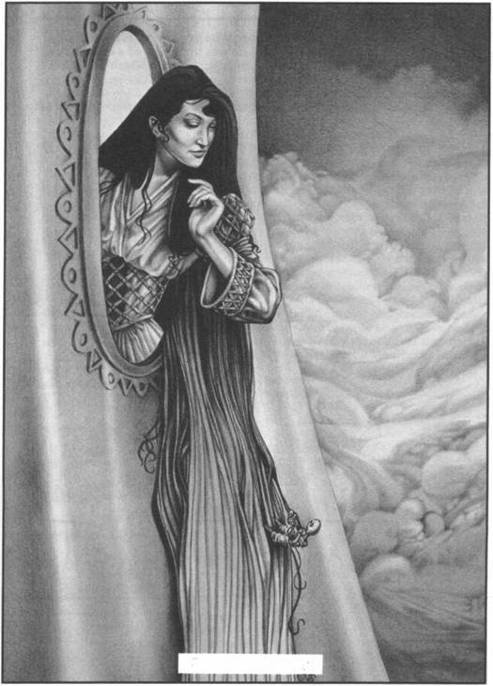
Rapunzel and Grundy
Jordan was a barbarian of the Fen Village, who lived in the reign of King
Gromden. His talent was Healing Himself. He was the victim of a cruel lie
which cost him his first life. He was the hero of a prophecy which predicted
the appearance of a young, well-formed barbarian riding a pooka he had
tamed, who would take the Hero's Challenge, which was to judge whose
magic of the twin magicians, Yin or Yang, was more effective in practice as he
sought to fetch Threnody to Castle Roogna. The outcome would determine
which half of Yin-Yang would serve the dominant half as King. He was never
to find true love until his flesh had rotted. Renee appeared, and he was
happy with her, not knowing for years that she was Threnody.
Threnody is the illegitimate half-demon daughter of King Gromden. She
bore a curse put on her by the Queen that if she ever returned to Castle
Roogna, the castle would fall. She has midnight hair and eyes. Her birth
disgraced the King so that his courtiers began to drift away from Castle
Roogna. Her talent is Demon-Striation. She can diffuse from supersolidity to
insubstance over time, grow big or small, and change shape to any form she
wishes, but each change takes an hour. She married Magician Yang but
suicided near Castle Roogna because she was unhappy and secretly loved
Jordan, whom she had cut to pieces to save him from Yang's more harmful
attention.
Jordan was restored to life by Ivy, who sought out where his bones had been
hidden, and the two of them found a way to bring Threnody back to life, too.
Jordan and Threnody travel throughout Xanth. The curse on her still holds
against Castle Roogna, so they have never visited the human capital.
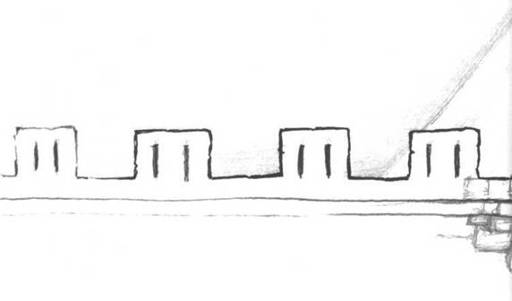
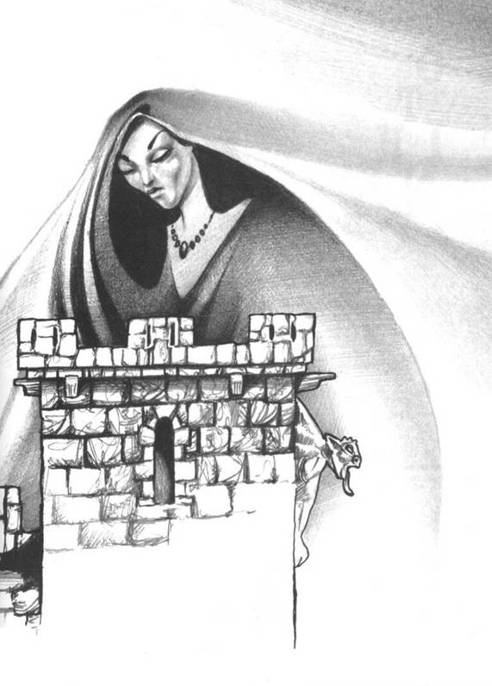
Threnody

Agenda Andrews: The first girl sent to
Grey Murphy by Com-Pewter. She has
brown hair and is excruciatingly well
organized.
Agent Orange: A vaguely catlike orange
creature who works for the Catapult in the
Region of Madness. It withers and kills
plants wherever it passes.
Alister. A boy of the Gap Village whose
talent is finding things.
Anorexia Nervosa: Grey's second girlfriend.
She is very thin, and always dieting.
Arrowhead: An elf of the tribe of Flower
Elves, who carries a bow and quiver of
arrows for protection.
Awl: An elf of the Tool Tribe.
Belo: A ruffian of the South Village. His
talent allows him to block any one of a
person's seven senses.
Beryl Bluebird: The Bluebird of Happiness
of the Magic Dust Village.
Bloodroot: An elf of the tribe of Flower
Elves, who carries a red bag containing
blood-poison as a weapon.
Bluebell Elf. Dainty lady elf of Flower Elves
who chose to exchange favors with Jordan
the Barbarian; she is an ancestress of
Rapunzel.
Blythe, formerly Blyght: A brassie of the
City of Brassies in the gourd. Has a mysterious
dent about her person, dealt her by
Smash Ogre.
Bookworm: A giant purple worm who lives
in the depths of a complicated maze which
can only be negotiated by solving the riddles
which appear on its walls in glowing letters.
The bookworm cannot speak aloud. Its
thoughts are translated to printed words
on the walls of its domain. It nests on a
huge mound of old books, which it keeps in
order by means of the Dewy Decimal
System, tiny droplets of moisture on the
bindings which only it can read. When the
bindings wear out, it spins new ones for
them. A voracious reader, it eats leaves of
irreparable books.

Buster
Brain Coral: A stationary entity of great intelligence, magic, and conscience that
lives at the bottom of an underground pool. It acts as the guardian of the Demon
X(A/N)th. Over the ages it has absorbed power and thought from the Demon, and is
one of the most magically powerful entities in the land. It can take control of a creature
by giving it powerful suggestions that are enough like its own behavior that it finds
nothing objectionable in its instructions. The coral acts as a buffer between the
Demon and the rest of the world, for if the Demon were disturbed (as it was by Bink,
shortly before the Time of No Magic), X(A/N)th's influence would disappear from
the land, and all magic would swiftly leach away.
Boy (1): Witness at Grace'l's trial; doesn't like girls.
Boy (2): Child who got lost in forest and was rescued by Girard Giant. No relation to Boy(1).
Bria Brassie: A lost Brassie girl with an Accommodation Spell to enable her to marry Esk Ogre; daughter of Blythe Brassie.
Brick Bat: Guardian of Draco's nest.
Brida: Alister's best friend in the Gap Village. Her talent is becoming a tabby were-cat.
Brunswick Bluebird: The Bluebird of Happiness of the South Village.
Bucktooth Goblin: Member of the Goblinate of the Golden Horde.
Bulls and Bears: Mundane animals that trade with one another and fight for dominance of the stockyard, a place where a little action can raise a big stink. The Bulls always go up, the Bears always go down.
Buster. Short for Filibuster. Senior village elder of the South Village whose talent is the manifestation of a huge red balloon capable of carrying up to four people in a basket below it. He fuels the balloon by generating enough hot air to lift it. Buster is a great talker.
Cactus: An elf of the tribe of Flower Elves, who carries a cactus thorn as a weapon.
Cat O'Moran: A water-going cat boat lent to Fortinbrass by the cats at Lake Ogre-Chobee.
Centurion: Centaur who comes to the Oracle for advice about his talent. He has one hundred fine arrows.
Charl: The centaur schoolmaster of the Gap Village.
Che. Colt of Cheiron and Chex Centaur.
Cheiron: A winged centaur, leader of the winged monsters. He is very handsome and well muscled, has silver wings and golden hooves, and can really fly. Cheiron is Chex's mate.
Chex: Winged centaur filly, daughter of Chem Centaur and Xap Hippogryph. Her
eyes and wings are grey and her hair, mane, and coat are brown. Her talent is in her tail,
which makes things light when it flicks them. With its aid, she can fly. Her wings are
not normally strong enough to support her weight.
Chilk: A boy of the North Village, whose talent is the invisible wall.
Chisel: An elf of the Tool Tribe.
Clem: Centaur schoolmaster of the South Village.
Com-Pewter. In an air-conditioned cave sits a metallic box with a series of buttons and a pane of glass on its front. It can revise the script of reality to conform to its liking. Everything it prints on its glass screen
happens. Created by the Muses of Parnassus to help with their work in recording reality, but they erred in the design. It is frequently foiled in Xanth, but has freer rein in Mundania, where free will is less valued. It
uses a Worm Program to set up Sending, an emulation which it uses to introduce Ivy to Grey Murphy, as part of the insidious, heinous, and successful plot to make them like each other. Similarly successful plots
have occurred elsewhere in Mundania, as married folk know.
Controlla: A female troll who is headwoman of the Magic Dust Village. Cowslip Elf: Cousin of Oleander, of the Flower Elves.
Craven: Sub-chief of the Chasm Clan of Goblins in the days of the Fourth Wave.
Crombie the Soldier. His talent is direction. He can whirl and point to anything he wants to find. He hates and distrusts women. He claims that it is because his mother could read minds and made life miserable for him and his father. He is married to Jewel the Nymph, whom he considers to be an exception to his rule
about women, because nymphs aren't really women. He was once changed into a griffin to enable him to be more helpful on a quest.
Crool: A goblin of Craven's clan.
Crown-of-Thorns: King of the Flower Elves.
King Cumulo Fracto Nimbus: Lord of the Air, Thunderhead, a cloud who crowned himself, is a puffed-up bag of winds who believes he rules Xanth, but he is all wet. He has inflated vanity and a stormy temper,
and likes to ruin events held outside. Fracto carries grudges clear across Xanth, but he is prone to flattery and can be thwarted by reverse psychology. He is an ill wind that blows no one good.
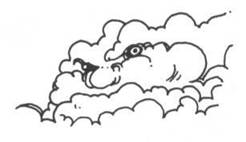
Cumulo Fracto Nimbus
Dogwood: An elf of the tribe of Flower Elves, who goes armed with a canine-tooth tipped spear.
Dolph: See Ivy.
Donald the Shade: The ghost of a man who died seeking wealth to feed his family. His discovery of a silver tree would have gone unknown if it had not been for the intervention of Bink, who helped him complete his
mission. Donald was able to go to his rest, knowing that his family would be provided for. His talent was flying.
Donkey: Centaur who resembles a donkey, being small and grey, with big ears. Friend to Ivy and Grey and Electra. His talent is to change the color of his hooves.
Doris: Curse Fiend girl with nice legs.
Draco Dragon: Possessor of the Firewater Opal. His nest is in Mt. Etamin, part of a constellation of mountains. Not a bad sort, if you like flying dragons.
Dungeon Master of Hurts: In charge of the painful aspect of bad dreams.
Duke Dragontail of Dimwit: Guest at Chex's wedding.
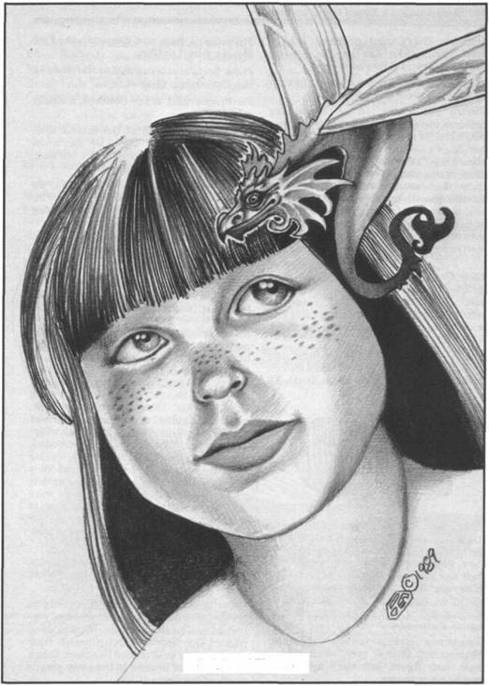
Dolph and Electra
Dyslexia: Grey's third girlfriend: a blue eyed blonde who has trouble reading because she sees things backwards.
Egor Ogre: Servant to Jonathan in the days of the Fifth Wave invasion.
Electra: She substituted for the sleeping princess, owing to Murphy's Curse, and was betrothed to Prince Dolph when he woke her. She's a nice girl who once had a thing about her father, but now loves Dolph desperately, despite the fact that he is three years younger than she (no father fixation there!), but he is betrothed to her only to keep her from dying. She is the size and form of a child with freckles, and her eyes are the color of wonder. Her talent is electricity; she can give a person quite a jolt.
Elsie. Citizen of Xanth 400 years ago, first girlfriend of Jordan. Taught Jordan how to send messages to the stork regarding offspring. Her talent was turning water into wine by touching the liquid with her finger.
X8
EmJay and her Ass MiKe (Michael and Keith): Researchers who prepared a lexicon so Mundanes would know about Xanth. X9
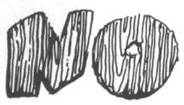
Eskil: Son of Tandy Nymph and Smash Ogre, half-human of which half is curse fiend, one-quarter nymph, and one-quarter ogre. Rather ordinary looking, with brown hair and grey eyes. His talent is protesting. If he says, "No!" he can stop a creature from doing to him what it intends without understanding why. He can become quite ogrish if provoked.
Euphoria: Grey's fourth girlfriend. Hypnotically intense eyes, swirling black hair, lush figure, but she's into mindbending substances.
Fairulter: A faun who frequents the Flee Market; friend to Glim.
Fates: Brida's cerberus; he and Marbles sing in a Barkershop Quartet.
Ferdinand: King of the Cowboys, a kindly ruler.
Fireoak: The nymph of the fireoak tree. Fireoak is also the name for the wood which, though it looks as if it's burning, makes good fireproofing.
Fortinbrass: A brassie of Brassilia. He left the gourd to study in the soft world. His fiancee is Patchricia, an animate rag doll.
Fulsome Fee. Duck-footed leader of the Fee, who need to interbreed with others to increase their stock.
Furies: Tisiphone, Alecto, and Megaera, old women with the hideous faces of dogs: furry ears, projecting snouts, and bloodshot eyes on the sides of their heads. They have hair coiled like the bodies of zombie snakes, not pleasantly alive like the Gorgon's; and huge ribbed bats' wings that serve them as cloak and hood. They scourge victims with shame and guilt, driving them nearly to suicide by blaming them for neglecting their parents. Their weapons are guilt, sorrow, and suffering. The Furies are armed with brass-studded staves hung with whiplike thorns. The whips are poisoned, drawing copious blood and agony, leaving festering wounds that will not heal. They can throw one curse of misfortune apiece, which makes a victim wish that he were dead. They call themselves the daughters of Mother Earth, but they have none of their own. They sprang from the blood of their murdered father.
Galatea: Ivory statue of the loveliest of pigs, being carved by the sculptor Pyg Malion.
Ghost Writer His talent is the ability to create realistic phantoms, steamy potboilers and illusory ghosts. His aim is to control the folks of Xanth through their emotions. He lives on the Phantom Ranch in the Plain of Grasses in the swamplands north of the Centaur Isle.
Prince Gimlet: Leader of the Tool Tribe of Elves. His body was temporarily occupied by the Sea Hag's spirit.
Gina: Lady invisible giant, originally the figment of a dream, now Girard's girl.
Girard: Invisible giant, trapped in the realm of the gourd, where he is visible. He was bound and bleeding for a long time in the gourd as the source of the River of Blood, until rescued by Grey.
Glim: Proprietor of a bookstall in the Flee Market. He will stall as long as he can to keep from selling a book; he loves them so much he hates to part with any.
Gloha: Daughter of Glory Goblin and Hardy Harpy; a winged goblin girl who participates
in the festivities of Chex's wedding.
Glory Goblin: The petite, dark-haired, lovely youngest daughter of Gorbage Goblin of the North Slope Gap goblins. Glory is in love with Hardy Harpy. She has incredibly shapely legs. Their joint talent is invisibility.
Gnasty Gnomad: A gnome of the Gnobody Gnomes.
Gnaughty: An elderly gnomide of the Gnobody Gnomes.
Gnifty Gnomide. A nice female of the Gnobody Gnomes.
Gnitwit: A gnome of the Gnobody Gnomes.
Gnymph: A young gnomide of the Gnobody Gnomes.
Goldy Goblin: Daughter of Gorbage, a very beautiful goblin miss with long golden hair and great legs. She possesses a magic wand which allows her to levitate objects or people.
Goody: Goblin, unconscionably polite, cured by a session with curse burrs.
Gorbage Goblin: Chief of the Rim Goblins of the Gap; father of Goldy and Glory.
Grabraham: New, young, timid Bed Monster under Ivy's bed, known as Grabby for short. He replaces Snortimer, who found romance.
Grace'l Ossein: Female walking skeleton, Marrow's girlfriend. She has nice bones, and is the source of the Skeleton Key.
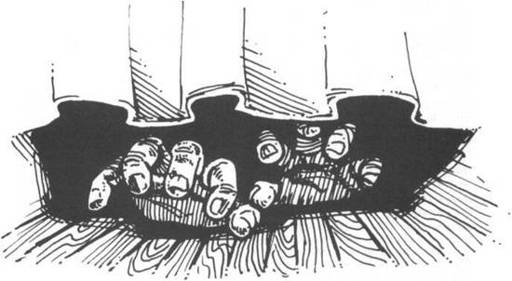
Grabaham
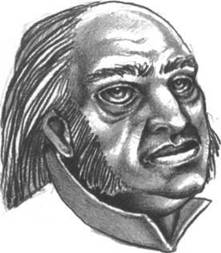
Gromden
Gromden: King of Xanth 400 years after Roogna, whose talent is that he can hold any object and divine its entire history, seeing and hearing it.
Grotesk: Goblin chief of the Goblinate of the Golden Horde. Mean, even by goblin standards.
Haggy Harpy: Leader of the Gap Harpy flock.
Handy: Dolph's regular Bed Monster.
Hannah Harpy: A harpy of the Gap Flock.
Hardy Harpy: Handsome harpy in love with Glory Goblin.
Harold Harpy. A prince who had been exiled by a rival to the harpy crown and preserved for three centuries by the Brain Coral, and only released when asked for by Dor.
Hatty Harpy: A harpy stoned by the Gorgon.
Baron Haulass of Shetland: A guest at Chex's wedding.
Heavenly Helen Harpy: The most beautiful harpy, whose downy feathers, clean lovely face, and shining brass claws made her First Concubine to Prince Harold Harpy.
Henrietta Harpy: A harpy of the Gap flock.
Henry: A deaf man who helps Ivy practice sign language.
Hoe: An Elf of the Tool Tribe.
Horace Centaur. A centaur zombie who died of an unfortunate accident during a game of people-shoes. His speech is slurred and his hide moldy and his face wormy, but he is not too far gone, and Ivy likes him, which counts for a lot.
Horsejaw: Tactless bully who lives near Castle Roogna.
The Horseman: First perceived by the Night Stallion as a threat to Xanth. A true werehorse who wanted to conquer Xanth. He is the son of a stallion and a human woman who drank from a love stream. In his horse form, he's a white stallion who wears a brass band about one ankle. As a human,
the circlet is around his left wrist. This brass band is a short circuit which diverts power from its proper avenue. He is a consummate equestrian who can ride any steed, willing or unwilling. His talent is to form a line-of-sight connection between any two places, which he used to join the gaze of all the Kings during the Fourteenth Wave with the peephole of a hypnogourd.
Hotbox: A blue female wyvern at Chex's wedding.
Hugo: See Humphrey.
Ichabod: Arnolde's buddy, a researcher and scholar from the library in a southern American city of the modern era. He is considered to be the best historian in the state of Alabama.
Ignor Amus: Very stupid juror at Grace'l's trial.
Invisible giant: A heroic giant who died in the wiggle swarm halted by King Trent and a salamander-transformed Bink. This giant was known to be 60 feet tall, though he was never seen.
Itchlips: One of the Mt. Etamin goblins.
Jama: Obnoxious youth of the North Village, whose talent is the manifestation of a sword.
Jennifer. A female dog.
Jewel the Nymph: She lives in the cavern beneath the Vortex, south of the Magic Dust Village. She is unusual among nymphs, for she has wit and purpose. Most nymphs are purely decorative, and have only one signal talent. Jewel is perfectly lovely, but she has an important job to do as well. Her job is to deliver all the gems of Xanth to their proper places in the depths of the earth. Her keg of gems is self-renewing, so that whenever some are removed from it, more appear. She rides a diggle who can
phase through the rock so long as she sings to it. It works for a song. She places the crystalline gems that the diggle has left behind in their proper setting once the diggle has stopped moving. Pearls are
thrown into oyster beds, where the oysters swallow them. Jewel's talent is the generation of scents and smells according to her mood.
Joan: A male fairy who lives in Birdland. He got a name at birth which was intended for
a female fairy, but until he met John was unable to switch for the right one.
Jody Lynn Nye: Nymph who makes Xanth gamebooks such as The Encyclopedia of Xanth and Ghost of a Chance. Some of the punniest puns have taken refuge with her. She kept coming up with so many formerly unknown folk, creatures and things that the regular Xanth author finally collaborated with her on a Visual Guide to, to, it's right at the tip of my, well, anyway, it's a pretty good listing of whatever in connection with something.
John: A small female fairy who accidentally got the wrong name at birth. She didn't get the correct name until her wings were burned beyond healing. She and Joan experienced love at first touch, so she stays with him in Birdland.
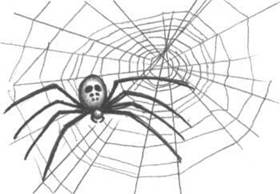
Jumper